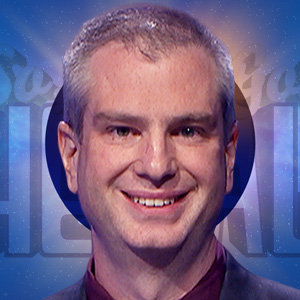So, You Got “The Call!”: Preparing To Be On Jeopardy!

I recently had a player who just got The Call reach out for help preparing for the show. I wrote down much of my advice, which was becoming a trend. What then happened was the simplest of brainwaves: “Hey, I bet other people have some advice to give, too!” Boy, did they! And as the responses began to come together in this document, I realized that there was something special in how everyone interacted. In that spirit, I’ve tried to preserve that energy and give the feel of friends at a coffee shop riffing off each other. I hope you enjoy discovering all of this as much as I did.
Since we’ve originally published this guide, a lot of players have had a chance to use it as part of their own show experience, and with that in mind, we reached out to them to see if they have their own wisdom they would like to add. For my own part, I also got to have the privilege of coming back to the Alex Trebek Stage for a Second Chance invitation, and getting to come back again, with this experience in hand was a privilege, and I would be remiss not to add my new reflections, as well. With that in mind, I’m proud to present the Second Edition of the Players’ Guide to Jeopardy!

As a former Jeopardy! contestant, I did everything I could to start preparing after I got The Call, knowing full well I was going to probably not win (mostly because I still don’t know any mountains or anything about history to this very day). But I wanted to play the best game I could. I studied lots of different things, from lots of different places; there wasn’t one singular place I could just read and say “here’s everything I need to do to have the best day ever”—until now. Thanks to David and a motley crew of other Jeopardy! success stories, BuzzerBlog is proud to host this wonderful compendium of everything you’ll need to do once you get The Call. If you haven’t gotten The Call yet, maybe you should start reading our other guide, on How To Get On A Game Show, where we talk about the Jeopardy! audition process, and other tips for getting on game shows in general. A warm thank you to all the contestants who helped out on this project by compiling their words of wisdom, and an especially big thanks to David for letting BuzzerBlog host this guide. Death be not proud!
— Cory Anotado
1-Day Jeopardy! Runner Up, Perpetual Meme
Table of Contents
Contributors
Document Version 2.0
January 30, 2025
Document Version 1.0
April 9, 2023
Initial Release
Congratulations. You just got “the call.”
You’ve just had the first of what is sure to be a sequence of unforgettable events in your life, and, though you don’t know it yet, your entry to an extraordinary club—Jeopardy! contestants. You’re excited, you’ve told a few people who can keep a secret, and now you are looking at this unbelievably long form as they are working to prepare for the possibility you might be doing a lot of interviews soon. There is so much to do! But how can you make the most of it, and most of all, how do you process it? Most of all, how can you make this count?
You hear many contestants talk about the “fugue state” you are in on stage. I call it “Game Show Brain.”
What is Game Show Brain?
Game Show Brain is most closely related to how your mind responds to high-stress situations, as your brain starts discarding inessential inputs and zeroing in on the problem at hand. (Readers of Malcolm Gladwell’s parascientific work “Blink” will recognize the reference.) Your pulse races, rising into the mid-100s. Time seems to both slow and speed up at the same time. You can feel the lights on you, and you must move fast and act fast, showing your best self. All that pressure now comes on you, and you start making mistakes. What’s worse, you know they are mistakes when you are making them. Sometimes a wrong answer pops into your head, and you can’t get it out of the way to find the right one. Why am I such a dork in this interview? Sometimes you draw a blank, and only a blank. And why is that other guy beating me on the buzzer all the time?? It’s all those ways your mind works that don’t usually give you that mental vapor lock that can hurt you.
Couch Brain is what you want. This is you at home, pen in hand, cat in your lap, watching the show, shouting answer after answer at the TV. You are making intelligent bets; you are navigating clues like Magellan. But you’re also at ease, telling stories like it’s four rounds deep at the bar. You are shaking off misses like they don’t count at all. You are watching triple stumpers drop with the same sort of dismissive shrug as at home. Most of all, you are unbothered. You aren’t necessarily trying to play the best, just your best.
We talk about this a lot because much of this guide is meant to help you bring the Couch Brain to the weird world of a game show set. These tips and stories are intended to provide examples and structures to deal with all the surprises you will have that day. The structures carry the stress, so you don’t have to. When you get on set, you are ready to be the same adorkable trivia machine you are with your cats at home…the best version of you. That’s why this guide exists—all of us who have been there before and looking forward to rooting for you want to help you be at your best.
What To Do Between Now And Before Tape Day
Start practicing!
There is nothing in this world you are your best at the first time you try it. This includes Jeopardy! Start tuning in every night, and spend some quality time with reruns on Pluto TV if you have more time. Here are the key things to practice:
Buzzer Timing
This is the single most leveraged thing you can work on. And one key thing to note is that this is buzzer timing, not buzzer speed. If you can get a USB digital buzzer, get one. If not, get a clicky pen and watch the show and develop the muscle memory of processing a question, making the decision of whether you would ring in or not, and going to town on that clicky pen when the camera cuts from the clue on TV to the players behind the lecterns ringing. Practice it standing up.

Dress in the clothes you’ll wear on stage.
— Grant DeYoung
4-time J! champion
Turn on every light you have in the room you are practicing, and shine a light directly towards your face to mimic stage lighting.
— Kevin Belle
3-time champion, 2024 ToC Quarterfinalist, Whiskey Ginger
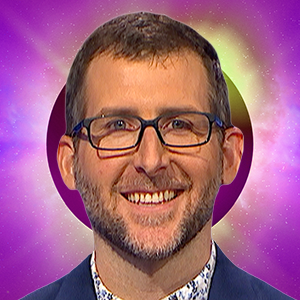
The more you can do to practice as if you were on stage, the more it helps.
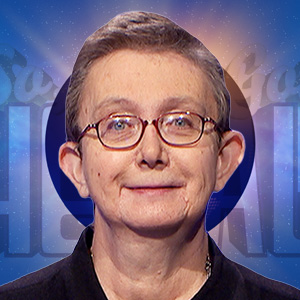
Definitely standing up! As soon as I got the call, I got even more religious about watching the show daily and standing up to practice buzzing in! It was a great way to practice not only buzzer technique but also to get in the habit of answering in the form of a question.
— Verlinda Henning
One-day J! champion, over-60 trivia nerd, and Twilight Wonk
Remember to answer aloud once the host finishes reading the clue.
— Diandra D’Alessio
2-Time champ, CWC semifinalist

Find an online game to play if you can get a digital buzzer. Get Fritz Holznagel’s epoch-defining work “The Secrets of the Buzzer”.
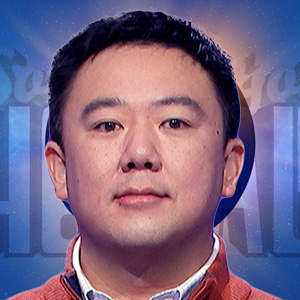
I’m a believer in Fritz’s recommended buzzer stance, although it’s important to find a technique that works well for you.
— Brian Chang
J! 7x Champ, 2022 ToC
Finding an online game can seem tough. After all, you can’t just google and find them…they tend to be a bit sub rosa because they’re in a fuzzy place copyright-wise. However, they exist and they’re excellent prep. If you’re involved in the trivia community online at all, send a few messages to people you know, and they may know of one or more groups who play simulated Jeopardy! games online, or know who to point you to who might know.
It’s worth asking. Playing along with a clicky pen and reading about wagering strategy is good, but there’s no substitute for having to buzz in against other players and having to wager in-game. Online games give you that experience before you step onto the stage. They get you used to the rhythm, the considerations, the calculations, and the pressure.
— rowan ward
Second Chance Champion, Chart Caller, and Omnipresent Trivia Destructobot
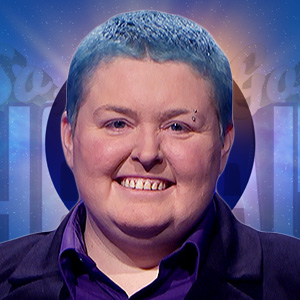

Make sure you practice responding as you would in the game, too. Many of us grew up trying to shout out the answers before siblings/parents, but when you’re actually playing, you want to take your time to answer. If you buzz in first and your lights go on, you have ~5 seconds to respond. Pause, take a breath, and make sure you say the response you’ve formed in your brain; you don’t get extra points for shouting it out as soon as Ken calls on you. With this in mind, practice responding as though you’re on stage, not on the couch with family.
— Mark Palmere
one-time Jeopardy! Winner, one-time Jeopardy! loser
Whatever you do, don’t let your moment in the pre-show practice game behind the lectern be the first time you ever play.
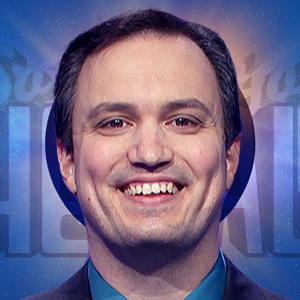
When you get to the show, the contestant producers will tell you about how you’ll know when to ring in: There are lights on the side of the board that aren’t visible at home, and there’s a person who enables the buzzers and turns the lights on when the host finishes reading the clue. Your goal is to match that person’s rhythm. You might do that with a “lights” strategy, which guarantees you won’t be early and get yourself a brief lockout as a result. You might go on a “sound” strategy and try to match the host ending the clue plus a pause.
You can mostly practice sound at home, but you won’t know the exact rhythm until you get to the show. I personally believe in a “vibes” strategy, but I was only able to achieve it after playing with lights for a while. Vibes isn’t actually functionally different from sound, but it changes the focus from host-plus-pause to anticipating the lights activity without seeing it. I was really into rhythm games in the 2000s and that actually served me well on the show. If you can spend a little time playing games of that style (Frequency, Amplitude, Guitar Hero, Rock Band), it’ll give you a sense of matching an event you know is coming. Of that series, the earlier games are better because you’re literally just pushing a button, which is what you do on the show. Other rhythm games may better match what you’re looking for; it’s a wide genre.
— John “TK” Focht
4 time Champion, 2022 ToC Semifinalist, and J!-ometry Creator
The Jeopardy! video games for Wii, Wii U, Nintendo DS and Nintendo Switch/PS4/Xbox Whatever are very good training tools for very different things:
- The Wii and Wii U games, especially on the hardest difficulty setting, can help you train to anticipate the host’s cadence. The material is also show-quality. The only problem is that Final Jeopardy! in these versions are multiple choice only.
- The Nintendo DS game is exactly the same as the Wii version, except that there’s no voice reading the clues. This is great for training on speed reading and on anticipating watching a visual cue in order to react to hitting a button. The Nintendo DS is also pretty easy to acquire or emulate: my iPhone 14 emulates the game perfectly. And if you’re smart enough to get on Jeopardy!, you’re smart enough to figure out how to emulate the Nintendo DS on your phone.
- The most modern version is also good for practicing “for the lights” as it were, and has relatively up to date material, but I’d only try this if you had no other option.
— Cory Anotado


The person enabling the signaling devices is reliable at timing the enabling to the end of the clue. Although Fritz’s book suggests that some ultrachampions use the “lights” strategy, I am very skeptical. I don’t know anyone who has done well on the show with a pure “lights” strategy, and I was not actually aware where the lights were during my regular-season run.
— Brian Chang
Buzzing is not about being fast. It is not even about being first. It is about being on time. When I would watch the show at home, I focused on the sound of the host’s voice. Every time I heard the host reach the end of a clue, I would snap my fingers–whether I knew it or not. The main goal is to train yourself to the cadence of the host and the sound of their voice.
— Luigi de Guzman
5-time Champion, 2024 ToC Semifinalist


I actually used my DVR remote as an improvised buzzer. If the clue was off the screen, and none of the podium lights were on, I knew I’d found the sweet spot.
I like to equate buzzing in on Jeopardy! to hitting a baseball: if you’re a fraction of a second too early or too late, it can be the difference between an “easy out” or a “home run”. Also, there are two other players swinging at the same pitch.
— Mike Elliott
2023 Second Chance competition semifinalist
To put some concrete numbers to it, neural processing limits reactions to the lights to about 230ms or so. (In my prep, I tested this on Fritz’s website over several hundred iterations with a variety pack of grips by having his read muted, giving myself only the lights to go on). Going on audio rhythm, I was able to halve that pretty consistently. Since my appearance and playing online games, I’m able to hit a rhythm at about 80ms with an acceptable error rate. The great monsters of the game can get to the 40-60ms range, but that comes with about 20% of their buzzes being early and incurring a 250ms penalty. Our experience suggests that the optimal buzzing strategy against top-flight players is around this zone. However, against “average” or rookie players, you gain more from dialing the aggression back slightly and avoiding penalties. But the critical point is “treat it as a precise rhythm to hit, not a lightning-quick reaction.” Precision, not speed – and this is why you sometimes see people with very unconventional buzzer grips (rowan’s high-lefty, Sam Buttrey’s two-handed attack) succeed: it’s the grip that lets them precisely nail the rhythm, more so than necessarily the fastest way to convert a neural impulse to a button press.
Having said all THIS, when I came back for Second Chance, I was hyper-calibrated to use the lights as a feedback mechanism for my rhythm attack. I would hit the buzzer and measure my motion against the activation lights. My experience on set was that I was coming in when the lights were solidly on (it felt like a good 80-120ms after the lights came on) and getting locked out early. While I would certainly allow that my own perception could be wrong, or that the activation point of the button could be higher in its stroke than I think (about two-thirds depressed), I cannot shake the feeling that the lights preceded the actual activation of the buzzers slightly. This could be an artifact of history, the nature of the wiring and controllers and how signals are transmitted or a deliberate setup to equalize the playing field between rhythm players and reaction players. No matter what the reason, it just emphasizes the point of being able to adjust what you’re doing on set to what’s happening, moreso that trying to be ultra-perfect in whatever you are doing at home. I always preach that the skill you are learning is the ability adapt rapidly to what’s happening, not developing a perfect stroke.

This is gonna be a long one, but buzzer timing was the biggest reason I was able to succeed in any manner on Jeopardy!, as I’m not a trivia mastermind and would describe my actual trivia knowledge base for the average J! player as firmly mediocre. Here’s the issue I have with most of the pure “sounds” and “vibes” buzzer timing strategies: even if you can get your buzzer timing down consistently to the 40-60ms range (as David mentions above) in a controlled environment, you will still buzz in early sometimes and get locked out or get beaten to the buzz because ELVIS (the lockout system J! uses) is not operated at a truly consistent, robotic level of precision. Even with yourtiming being locked in at a basically “human optimal level,” you’re still at the whim of the person operating ELVIS. As such, your best option in my opinion is to both 1) reduce the raw mechanical movement and effort required to actually buzz and 2) operate under a “vibes” strategy informed by a quick reading and interpretation of the clue, utilizing aspects of a “lights” strategy. Let’s break each of those down further.
When I say “reduce raw mechanical movement,” what does this mean? Well, I agree with David that the buzz trigger point is not when the button is flush with the “button hole,” or whatever it’s called; this is true of basically any lockout system since it prevents damage to the buzzers themselves. I tested this on my own personal buzzer system I take to quizbowl tournaments I volunteer at and found similar results to what David believes; the trigger point is somewhere around ½ to ¾ depressed from the “resting state.” I have no reason to believe that the J! signaling devices are any different, and I employed this knowledge to decent success by depressing the buzzer about ¼ to ⅓ below its “resting state” while a clue I wanted to buzz on was being read and depressing the button further when I wanted to buzz. Even if this saves only 20-30ms, you’ve likely shaved 10-20% off your reaction time – it’s not nothing, and with margins being ludicrously thin between going on a 10+ game run and losing in your first game, even tiny edges can swing games.
In regards to the “‘vibes’ with quick reading” strategy, consider an underrated piece of Jeopardy! strategy; you can read faster than a person can talk. Take this clue from one of my Champion’s Wildcard games:
“A Miskatonic University team uncovers horrific artifacts in Antarctica in this author’s ‘At The Mountains Of Madness.’”
Start a stopwatch and read this clue from start to finish out loud at a “game show host cadence.” I clocked myself at around 7.5 seconds. Now, do the same thing and read it silently to yourself as quickly as possible while retaining all relevant facts – for me, this took about 2 seconds. That means that I have 5.5 seconds between reading this clue and processing it, preparing to buzz, and actually buzzing. If you can come up with the correct response here within 3 seconds (“Who is Lovecraft?”), you still have 2.5 seconds to prepare the buzz action. Here’s where my personal “vibes” strategy would come in; I identified the last word of the clue (“Madness”), unfocused my eyes from the clue, and instead focused on two things: one, I anticipated hearing the word “madness” as the clue was being read, and two, knowing that the lights would come on immediately after “madness” was read, I primed the buzzer to trigger at a “comma’s pause” after the final word and began the “secondary press” once that slight pause began post-read. Anecdotally, I noted that lights would frequently come on while I was in the act of depressing the button.
While rehearsal is not the best time to refine your timing, rehearsal can be used to implement the “first step” of this strategy, while the first 5-10 clues of the Jeopardy! round should be sufficient to nail the “second step” such that you’ll be prepared for the last 50 (or so) clues (where the vast, vast majority of the dollars and at least two, but very likely three of the Daily Doubles are!)
— Michael Menkhus
2 Time Champion 2022, 2024 CWC Finalist, Circled As “A Problem” On Luigi de Guzman’s “Potential Opponents” Prep Sheet, described by Juveria Zaheer as “an absolute fiend on the buzzer”
If your buzzing strategy isn’t working well early in your game, don’t be afraid to adjust. I was going by sound early in my Second Chance game, and kept buzzing way too early. After the first break, I decided to switch to going by the lights, found myself getting in more frequently, and was able to make back some ground.
— Mike Elliott


The buzzer on-stage does not have a tactile indicator when it actuates. That is: there’s no “break” or “click” that lets you know you’ve buzzed in–at least not that I could feel. Ideally, I prefer to treat the buzzer like the trigger on a pistol or rifle: Take the first-stage slack out of the button, hold right at the point where the “break” is, and wait for my chance to buzz in. When I realized I couldn’t feel a break, I started treating the buzzer like a skeet shooter uses a shotgun trigger: a quick, sharp, slap. That got my timing dialed back in.
— Luigi de Guzman
Experiment with buzzer grips until you find something that feels comfortable. If you’re comfortable, you’re more likely to free up that bit of mental space that’s actually concerned about how you’re holding the buzzer, and let yourself fall into a cozy buzzer rhythm.
— rowan ward


To rowan’s point, I accidentally stumbled onto a great buzzer grip during the CWC quarterfinals that was separate from my original run; I had to scratch an itch on the right side of my face so I transferred the buzzer from my right hand to my left hand during a break, held it against my torso in a light fist, and scratched the itch. I then realized that I could just loosely hold the buzzer with my hand while pressing it against my torso and isolate my physical buzz action to just my right thumb, not engage the rest of my hand/wrist. Did it help my timing? Maybe! Maybe not! But it was comfortable, so I stuck with it.
— Michael Menkhus
When testing grips, bear in mind that the standard “hold with one hand and hit the button with your thumb” may not be the best option. Take a clicky pen and try different options: one hand, two hand, thumb buzzing, etc. Turns out my ideal grip is holding the buzzer in my left hand and hitting the button with my index/middle fingers from my right.
For timing, I found playing rhythm games like Cytus II or beat saber to be really helpful. Anything to help with timing precision.
— Miranda Onnen
S39 Silver Medalist, and Pop Culture Jeopardy! game winner on the Personality Hires

To translate this into something actionable you can do, I offer this example: For rowan’s performance in Second Chance, our strategy was to drill like maniacs on maximum aggression to try and drive that timing down as far as possible, but then have rowan take a step back from that edge and “grip it and rip it” for the games, or to go at 80% of their max power. In other words, we tried as hard as possible to get “maximum performance with moderate errors” down as low as possible so that “relaxed performance” would become lethally effective. The results spoke for themselves. To distill this down to simple advice, “practice the rhythm approach as much as you can, get good, but when you get on set, you are better off loose and relaxed than hyper-aggressive.” This was also partly inspired by Brad Gilbert’s description of Ivan Lendl’s serving strategy in Winning Ugly: Lendl would start serving at maybe 80% power, and wouldn’t start unleashing everything he had until he was settled into the game with the power and accuracy there. In the same vein, use your best performance when it’s there, and not before. If you are against someone running red hot or a really good super-champ, you might be forced to press and try to get some super-precise buzzes, but if that’s the case, it will be challenging regardless.
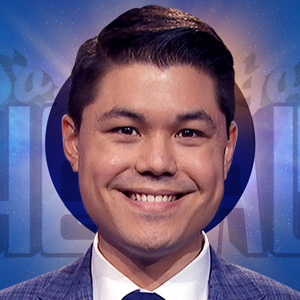
Don’t depend on the rehearsal that occurs on tape day. It goes by very quickly, and you will only have an opportunity to play a fraction of a game, meaning you may only be able to buzz in 10-15 times (fewer if you’re in the set of players that practices during the mock Final Jeopardy!). So, practice early at home.
— Zachary Newkirk
6-day J! Champion, 2022 ToC, Longest J! champ on COVID technicality
One thing that helped me a lot was building my stamina by watching (and playing alongside) 5 Jeopardy! episodes in one sitting. It was one of the things I could do to replicate the tape day setting (since they film ~5 episodes a day). The tape day is very tiring (perhaps doubly so if you’ve just flown into California!) and it’s important that you not only have the energy to perform well in a game, but in your subsequent games.
— Cindy Zhang
Second Chancer, J! Honors Best Signature Winner


Take it one clue at a time. Whether you are going off of the lights or the host’s voice, all of your focus should be on your cue as the host finishes speaking. Ideally this means you’ve decided whether you will buzz in well before the host gets to the end of the clue. Practice speed reading the clue ahead of the host’s reading so you will be all ready to go by the time they reach the end of the clue. Buzzer timing can be fickle, you may have a stretch where you feel absolutely dialed in & another where you think you may never get in first again. Just take it one clue at a time & don’t be afraid to adjust your timing on the fly.
— Eric Ahasic
J! 6x Champ, 2022 ToC semifinalist, Daily Double enthusiast
Practice can and will help with buzzer timing. Using Fritz’s website, I was able to get from about 115ms down to about 65. Overdoing it can lead to some wrist soreness, and a brace has helped me recover from some tendonitis I developed during my preparation.
— Grant DeYoung

Wagering
As you watch Jeopardy! games on DVR, plan your strategy on wagers for both Daily Doubles and Final Jeopardy!. If you master this and the buzzer, you are well on your way to a winning streak. For Final Jeopardy!, The Jeopardy Fan has a great guide.

Don’t shy away from understanding the Final Jeopardy! betting guide, even if you’re not a math person. There may or may not be a Bible or World War 2 category in your game, but unless things have gone particularly badly, you will be wagering in Final Jeopardy!. Wise wagering here can often determine whether you win the game.
— Brian Chang
Daily Doubles are more fluid, and the more practice you can get regarding betting, the better. Generally, the more you can test scenarios and results, the better. Another thing to remember: when you are on set, you will feel the need to issue a prompt answer on your wager. Please don’t fall for it. Take the time you need to make the right bet.

In the Jeopardy! round, it is often a good idea to go all in on Daily Doubles, since there is so much money in Double Jeopardy!, including two more Daily Doubles. The rewards for doubling through are much greater than the risks of dropping to zero. In Double Jeopardy! your scenarios are particularly fluid, and your wagering choice will depend on factors like the current scores, how much money is left on the board, and whether there is another Daily Double on the board.
One good thing to find out is your approximate hit rate on Daily Doubles. Take a few hours one day, go through some fairly recent Daily Doubles on J! Archive, and track how frequently you get them right. Stick to Daily Doubles from the last five or ten years. Not only will this give you a good handle on what subjects are coming up frequently in Daily Doubles, but it also gives you a more empirical idea of how well you do on them. A high Daily Double get rate means you can plan to play them even more aggressively, even in Double Jeopardy!
— rowan ward
When you’re planning your strategy, actually practice it. When you watch games in the runup to your taping, figure out what you would wager for each one. Pause the DVR when you can see the scores and reason it out. Say your wager out loud so you get used to saying a big number when necessary. This is practice, just like anything else in a game. It’s less nerve wracking to make a big wager when you’ve done it before, even if it’s just in your house.
See what the contestants wager and decide if you agree with them or not and, just as importantly, figure out why you agree with them or not. That’ll give you comparison points to use when you’re the one on the stage, and you can feel confident in reaching a decision quickly.
The Final Jeopardy! wagering strategy is worth keeping in mind when wagering on Daily Doubles late in the game. You’ll want to get as good an upside on the wager as you can with as little downside as possible. Obviously getting to 2x your nearest opponent is valuable, but the transition to crush at 1.5x is underrated. Getting the lead is good if you’re good at FJ.
Conversely, falling below your opponent is bad if you’re bad at FJ. Falling into getting crushed is underrated as a bad thing (in this direction, that’s at 2⁄3x your opponent). And falling to getting locked out at 1⁄2x is the worst. Sometimes it’s still the right move to risk falling below those benchmarks, but you want to get the upside of crossing the good lines upward if you’re correct.
— John “TK” Focht


On Daily Doubles, my advice more often than not is, to the tune of your local high school cheerleader, BE! AGGRESSIVE! B-E AGGRESSIVE! B-E-A-G-G-R-E-S-S-I-V-E! AGGRESSIVE! WOOT WOOT! AGGRESSIVE! WOOOOOO!
If you get a Daily Double in Double Jeopardy! and you’re not in first place, my advice is to bet enough that you either get to first place or pull the trigger on the True Daily Double to get as close as possible. The only thing worse than betting big on a DD and getting it wrong is betting too small, getting it right, and losing in Final Jeopardy! because you didn’t put yourself in a position to win. Until you’ve secured victory, you haven’t won any money, and your score is just imaginary points.
As for Daily Doubles in the Jeopardy! Round, I never bet anything less than the maximum on the ones I got (either a TDD or $1000 if you’re still below that level). No reason not to solidify your position as early as possible.
— Michael Menkhus
The points made about playing a lot of practice games to build resiliency and shorten your memory are especially valid when formulating your wagering strategy for Daily Doubles and Final. My base rule for Daily Doubles was to not ever bet less than the face value of the clue. The game situation would determine the level of calculated risk I’d take. I was fortunate to have led in each of my three Finals – two in lock (“runaway”) fashion, so I was betting from a position of strength. The J-Archive wagering calculator is a great tool to create different scenarios and determine how you would wager given your position heading into Final.
— Will Weiss
Season 41 2-time champion


A daily double is your chance to take control of the game. If you are getting out-buzzed or don’t have a significant timing edge over your competition, then it’s your best opportunity in the game. There’s some good writing out there, but here’s my brief summary of what I believe:
- If it’s the first round or less than halfway through DJ, bet it all unless you hate the category.
- If it’s later, then bet to either lock the game or get back in contention.
I wiped on my second TDD. I thought about it for 5 seconds, because that’s how long you have to feel sorry for yourself before the game starts again. Practice games against hard competition really helped me out here. Wiping out on the show isn’t so bad if you’ve done it a bunch of times in practice games. Get your money back!
— Mehal Shah
2 time regular champion, 2025 CWC Champion
For me, I had to practice getting confident making big wagers on Daily Doubles, and then I had to practice reining it back in sometimes and trusting my instincts on whether or not a category was good for me. If you’re in a close second and hit the DD, whether you max out or make a more measured bet should depend more on whether you think you’ll get the clue right than on what maximizes your odds of winning if you do get the clue right. Self-fulfilling prophecy though it might be, I never missed a DD up there in a category where I felt confident, and I never got one in a category I felt was going to be a problem. Spending time in the archive will help you hone that instinct for which categories feel safe or risky.
For Final Jeopardy!, they give you a piece of paper and as much time as you need to make your wager. I strongly encourage you to use both! Do the complete math, at least two times. You can write a potential wager on the screen and then ask them to erase it, but only if you haven’t hit the button to lock in your wager. Once you’ve hit that button, there is no route to change, so take your time on the scrap paper beforehand.
— Xanni Brown
2024 Second Chance Champion, and CWC quarterfinalist

Clue Selection and Daily Doubles

In my practice games, I found that whoever finds the most Daily Doubles tends to win the game. Daily Doubles are crucial not only to increase your own score but to deny your opponents the opportunity to double up and cause you trouble. Of course, a large Daily Double wager can be fatal with a miss, but even mediocre Jeopardy! players should have higher than a 50% get rate on Daily Doubles. Because of all this, I think the most important principle of Jeopardy!, which many players don’t do well, is that you must always be hunting for Daily Doubles until they’re uncovered. I’d bet that the mere fact of finding a Daily Double increases your percentage expectation of winning the game by a huge margin.
— Brian Chang
Remember, the value of controlling the Daily Doubles is not just your taking a massive leap in your score; it’s keeping them out of your opponents’ hands. It’s more ideal to lose $5 on a Daily Double in your nightmare category than see an opponent double up on the same question.

Daily Doubles are not distributed randomly. The chart below shows a heatmap of Daily Double placement based on J-Archive data. You’ll see two notable trends: (1) the fourth row is the most common place you’ll find a Daily Double, and they are very rarely in the first row, and (2) Daily Doubles appear less often in the sixth column (which is often a wordplay category). Daily Doubles also tend to appear in academic categories more often than pop/gimmick categories.
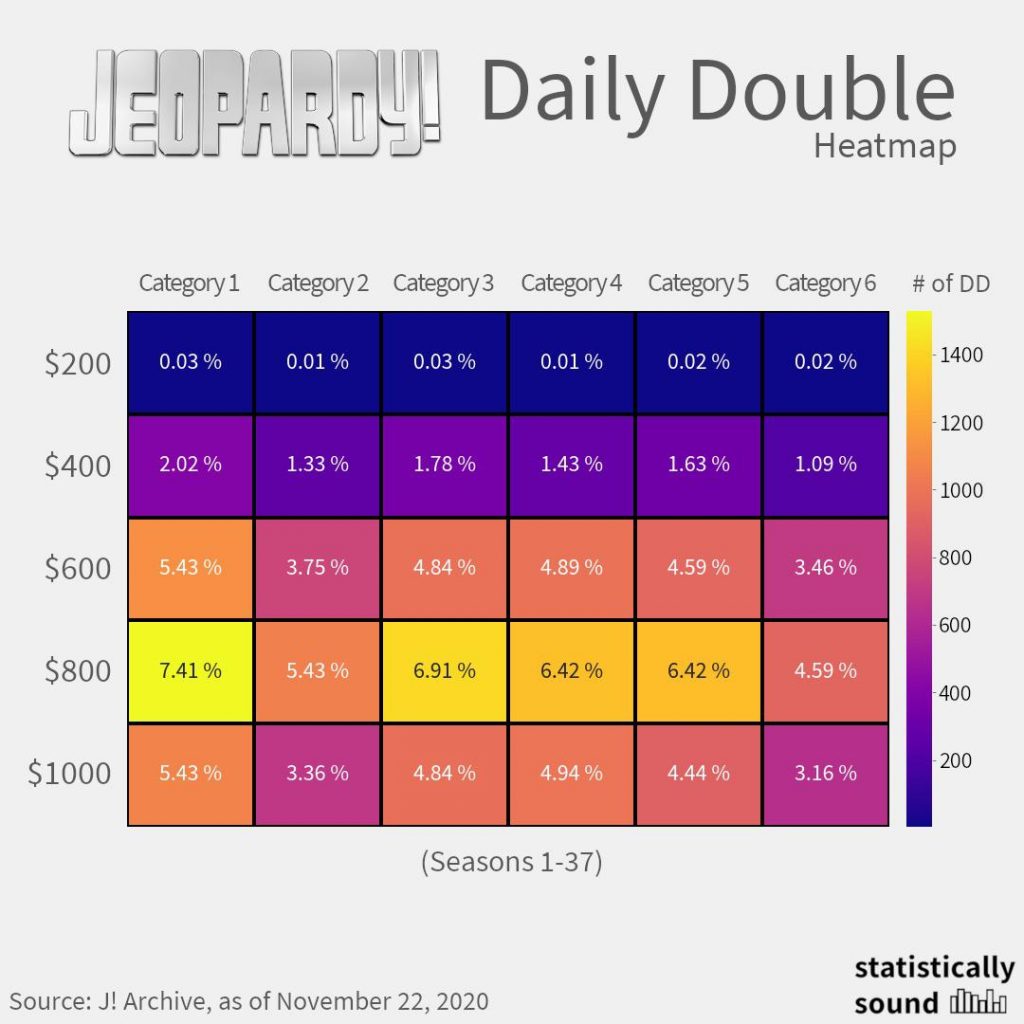
The old-school top-down approach to Jeopardy! clue selection is at odds with the fundamental principle that you must always be hunting for Daily Doubles. If you and your opponents are evenly matched, you’ll have control of the board about 1/3 of the time, which means you’ll be able to select about 10 clues in each of the J and DJ rounds. If DDs never appear in the first row and are evenly distributed among the other 24 clues, you have about a 4% chance of finding a DD in the J round and an 8% chance of finding a DD in the DJ round if you select a random clue outside of the first row. That’s huge! You effectively forgo that chance—and the corresponding boost to your percentage expectation of winning the game—by choosing a clue from the top row. This is why top-level games (like what you saw in GOAT and most TOC games) tend to clear clues from the bottom of the board before moving up.
There are detractors from the Always Be Hunting school, usually with the justification that (1) top-down selection makes them feel more comfortable as they get adjusted to the flow of the game and (2) sometimes, seeing a few clues in a category will give you a better sense for what the category is actually about than you can get from the category title alone. If you’ve been playing practice games, hopefully the effect of (1) is negligible such that you’ll be prepared to tackle the bottom row straightaway. To be sure, it’s important to play the version of the game with which you are most comfortable, but your practice should aim toward making that synonymous with the expectation-maximizing version of the game. I don’t find (2) particularly availing. Ambiguous what-are-they-looking-for categories are not actually that common. The equity edge from finding a DD immediately, to me, outweighs the value of additional information you would have gotten from seeing a few clues in that category first.
Remember that Daily Doubles never appear in the same category. That means that once one Daily Double has been uncovered in Double Jeopardy!, if you have control of the board, you should not return to that category (absent a very good reason, such as needing to run up your score in a favored category before doubling up). Remembering where the uncovered Daily Double was takes practice. That’s part of the value of practice games.
Daily Double hunt early and often and capitalize on the opportunities!
— Brian Chang
I will co-sign on this one. Not doing this was a significant error in my game, and it’s still one of my most glaring weaknesses in the practice games I play today. The marginal value of “getting used to the category first” is so thin in all but the most exotic categories; I wouldn’t bother. The other side is that the later the Daily Double emerges in the game, the more volatility it introduces. If you are playing against some emerging super-champ, you might want the volatility or the chance to build up enough score to take a giant swing. You also give your opponents more opportunities to find them, and “having the daily doubles” is significantly better than “not having them.” The cases where you wouldn’t hunt a Daily Double are so much at the edges it’s not worth remembering them.
When I came back to Second Chance, my fortunes followed my Daily Double hunting. My wins came when I found them and bet strong. (Specifically Ken pointed out in the post-game chat that I had 22 right where Susan Shulman had 21, but I won on the back of finding both Daily Doubles in DJ. Our Coryats were $20,200 and $18,200, respectively, but I won $37,463 to $25,601 because I picked up an extra $8,200 on DDs that she never had a chance at, even though I underset my second one.) My losses came when I “got scared” the DD was in a category that one of the of the other people on stage would like better (Ohio State Universities, when Ohio native Hari Parameswaran was on stage with me), so I didn’t go hunting there only for someone else to collect. Stay strong, stay relentless, and control the wagering clues, no matter where they hide.

Once you’re in the pool, and especially once you have a tape date, it’s worth keeping track of your Daily Double get rate. In my first game I very nearly lost after having quite a dominant lead because I was too timid in my Daily Double wagering. I knew intellectually that betting big was probably the right move, but actually doing it was really scary! After surviving a near loss, and going 2/2 on DDs in my first game, I felt emboldened to do a True Daily Double in my second game, which paved the way for a runaway win. After that, I did quite a few TDDs during the rest of my run. Why am I bringing this up in the context of preparing ahead of time? Had I been tracking my DD get rate I’d have known it was above 85%, and that would likely have given me the nerve to go big in that first game. Knowing your get rate on wagering clues can be key to having the confidence to go big when you get on the stage for the first time.
— Alison Betts
Bullsh*t champion, also won a full of week of Jeopardy!
I made a large spreadsheet of all DDs for a year, their categories, and answers. I used this to determine my get rate for both strong and weak categories. For me, the difference was only 20% which was a big surprise. That gave me the confidence to wager aggressively in nearly all circumstances.
— Mehal Shah


Over the last five years, Daily Doubles are distributed as follows:
Jeopardy! round:
Row 1: 0.2%
(not a typo) (0 in Season 39 regular play as of 3/30/23) Row 2: 11% (6%)
Row 3: 29% (20%)
Row 4: 34% (44%)
Row 5: 25% (30%)
Double Jeopardy! round:
Row 1: 0.2%
(still not a typo) (0 in Season 39 regular play as of 3/30/23) Row 2: 16% (17%)
Row 3: 31% (31%)
Row 4: 33% (31%)
Row 5: 19% (21%)
Daily Doubles in DJ are most commonly in adjacent columns or two columns apart, with decreasing frequency for three and four and almost never five. (That’s because DDs in column 6 are less common.) Column 1 and 3 together is the most common combination. They’re most commonly one row apart (nearly half the time!) and most of the rest of the time they are either on the same row or two apart. The most common Manhattan distance between them is three, followed by two and four, then five, then one (next to each other), then all other values. Over the course of regular play in Season 39, the Daily Doubles have maybe drifted apart a little as the most common Manhattan distance is four in this season, followed by three and then two.
— John “TK” Focht
If you do this right, you may also get the opportunity to find back-to-back Daily Doubles on consecutive clue calls. If you are so brave as to “Roger Craig” those Daily Doubles and go all-in on both (or as I call it, going ‘Full Schiffler’), you could amass a potentially unsurmountable lead. There is little that can be more defeating to an opponent than to watch their hopes at getting a Sunday punch in on someone disappear or to see their own giant lead evaporate in a cloud of bold wagers. It seems like a small thing, but these momentum shifts can considerably affect the crispness of buzzer timing and really quickly throw a game out of hand.
Conversely, as powerful as this is, you must also practice being on the wrong side of a Schiffler and knowing how to come out of it guns blazing, ready to run over the board and make a comeback. Having that fighting spirit to squeeze the most out of every game, and never letting a turn of events take you off your best performance is a potent edge. Here I cite rowan’s Immortal Game, where they ran out to a dominant lead in the J! Round, missed a big bet on the first Daily Double, and then Schifflered the second.
Rather than receive this second Daily Double with the energy of defeat, rowan instantly shoved all-in with an “I’m getting my damned money back” attitude, doubled through, and then steamrolled into what I maintain is the most extraordinary single-game performance (accounting for quality of competition) in the history of the show. But all of this could have turned the wrong way without the resilience and attitude to forget the events of ten seconds ago and keep swinging—and they delivered a knockout blow.

IF YOU ARE READING THIS IN PREPARATION FOR AN ADVANCED TOURNAMENT: The distributions for DDs are likely to look different, through row 1 will probably still be deprioritized. Tread carefully. The 2022 TOC had more DJ DDs in row 2 than any other row, for example.
— John “TK” Focht
I believe clearing the bottom rows first & building up a bankroll before (ideally) finding the Daily Doubles is the optimal strategy for clue selection, but it is also a lot more complicated when you are diving into the bottom row of a vague category. I tried a “hybrid” top-down approach where I would start at the 3rd row & work my way down a category from there. Daily Double hunting is absolutely essential, so you’re still hitting the main rows on the DD heatmap while also getting some of the top-down continuity in clue difficulty. I don’t have hard data on this but daily Doubles also tend to show up more in the “academic” categories, while almost never showing up in video or sponsored categories, so use that to your advantage!
— Eric Ahasic


The stats and heatmaps are valid, and you would be wise to familiarize yourself with them to the degree that you can. That said, the choices of where the Daily Doubles are located are subjective decisions made by people, so putting yourself in their shoes and asking yourself “If I placed the Daily Doubles on this board, where would I put them?” is an exercise worth doing and repeating as many times as you can between now and your tape day. As you watch the day’s episode, make guesses where they are and keep track of how often you are correct. If you are studying old games, search for the Daily Doubles first until you find them before going through the rest of the board, and try to find them in as few selections as possible.
As others have said, there is only one true error that you can make in clue selection, and that is staying in a category where a Daily Double was already revealed if there is still another Daily Double on the board. It does not matter if the rest of the category is in the white-hot center of your wheelhouse, leave it alone! Trying to find the other Daily Double while you have control of the board ALWAYS takes precedence. Those other clues will still be there later in the round.
— Jared Watson
3-Time J! Champion, ToC Semi finalist, and creator of the most awesome cover of the J! Theme Song ever
Clue selection is critical, and was perhaps the biggest determinant between my first appearance loss (no DD hunting strategy) and my Second Chance Competition win. For me, this meant starting with 4th and 5th row clues in “academic” categories I felt strong in, then moving to 3rd and 4th row clues in “academic” categories I felt weaker in, then following my heart (while avoiding top row and any column that had a previous DD). This helped me balance between maximizing my DD odds and retaining as much control of the board as possible.
— Xanni Brown

Start Studying
In the 3-5 weeks between The Call and Tape Day, you aren’t going to radically make yourself a more intelligent person. But there are things you can do that will have a significant impact. Right now, the number one thing to do is get the Anki flashcard app and start drilling some essential things. The Anki app for the desktop is free, as is the AnkiDroid app for Android. AnkiMobile for iPhone is $24.99, but well worth it if you plan to study on mobile and not a desktop. AnkiWeb provides slick syncing features between desktop and mobile for free, making it easy to either study both places or make cards on a computer and then study on your phone with the same decks in one continuous state.
- Learn all the World Capitals, Longest Rivers, and Highest Mountains: these are the meat and potatoes of Geography, a subject that always gets asked.
- Get a deck of Jeopardy! Pavlovs. Pavlovs are specific key phrases that almost always connect to one answer. For example, “Finnish composer” is almost always “Jean Sibelius.” Learn these. And studying a Pavlovs deck is a better use of your time than downloading the vast deck of hundreds of thousands of Jeopardy! clues available on AnkiWeb shared decks and trying to focus on that since the Pavlovs are turns of phrase that come up again and again.
- Attack your weaknesses. Bad in literature? Start studying Shakespeare. Bad at science? It’s back to high school chemistry and physics. You will gain more from moving from “a black hole” to “I can steal a few clues” in your worst category than from moving from “nearly invincible” to “fully invincible.”
I studied medium hard before my original run, and I got a couple questions in 4 games that I knew because of my studying. I studied WAY harder for the ToC – not because I thought that I would suddenly learn about mythology, which I have never cared about, but because I knew I would be so disappointed if I lost because I didn’t study hard enough. It’s the only thing I felt like I could do with all the anxiety I had leading up to the ToC, so I jumped in hard. It didn’t help me one bit (!), but at least I went home knowing I did absolutely everything I could do.
— Kevin Belle


Everyone has different strengths and memorization strategies, but I think some “lower-hanging fruit” to memorize in history categories are (1) the US presidents, the years they were in office, and the years they were elected or re-elected, (2) British monarchs and the years they reigned, and (3) current or recent major world leaders.
— Zachary Newkirk
Maybe you’re not a sports person, don’t like action movies, or know nothing about prog rock. It’s OK to write these off (or save them for the end of your studying). These are the sorts of categories that tend not to show up all that often on the show, and when they do, they tend to be in the Jeopardy! round. Your best bang for your buck comes from studying the academic categories (i.e., literature, particularly author-book pairs; geography; U.S. history).
— Brian Chang

Most clues are written for a high school education or lower, so resources aimed at that level are the most useful to you. Coincidentally they are also usually the best at making what they teach memorable. For Presidents, I’m very fond of “Yo Millard Fillmore” by Will Cleveland for the quick, noteworthy study of the sequence. The book also relies on the “hitching post” approach for remembering the numbers of presidents – it only ties a number to every fifth president. So when they ask for the 18th president, the mental process is “15 → Buchanan → Lincoln → Johnson → Grant.” In the game, I can decide to ring in and solve the problem if I see a president and number.
Similarly: I don’t remember every year, but I know that Jefferson was elected in 1800, Fillmore was elected in 1850, etc., and that’s usually enough to efficiently pin a year to a president. Some of this is just an artifact of how my brain works. (rowan’s mental processes are entirely unlike mine, and their rote memorization skills are unparalleled, whereas I have to use relational data, visual images, or a life experience to tie a fact to.) So take this as a suggestion of something that might work for you rather than a mandate.

Something that helped me a LOT was to go to the J-Archive and check out categories (a) where I was weak and (b) that made frequent appearances. I worked on those and enlisted my local trivia buds to help me by sending me questions focused on those areas.
Just playing trivia (we play almost every week) helped me keep my head in the game, and kept my brain cells functioning at a high level. I know it sounds like a cliche, but you lose it if you don’t use it. As an over-60 person, I work hard at staying mentally vibrant, which paid off in J! and real life.
— Verlinda Henning
Flashcarding after you’ve gotten the call is, in my opinion, much more about training your brain to recall facts in a Jeopardy-timed rhythm as is it about learning any certain facts. Across five games played on my first run, I only had two facts come up that I learned in my flashcard-cramming appear on the show, but learning to remember things at a pace consistent with the show was much more valuable to my success.
— Grant DeYoung


Second this… getting the brain firing hard and often is the key during prep imo.
— Kevin Belle
I also noticed it got easier after a few weeks of intense studying. The more I exercised my learning “muscles,” the better I got at it, and I could sense a lot of ways my brain started acting more like it did as an adolescent when I was an absolute sponge for this stuff. I was picking things up faster from my study, and honestly, I was enjoying it. It’s one of the reasons I keep doing this stuff today. (also, playing Jeopardy! is fun.)
My other big recommendation is to go on J! Archive and play through old games. One handy tool is the j-play extension for Chrome. This will convert J! Archive games into a board format, cycle through the clues in order, and track your Coryat score. This was an essential tool for monitoring my progress. I also played ten games a day, figuring that’s double what I might have to do on stage (Like Gen. Suvarov said, “A hard drill makes an easy battle”) and getting myself to a point where I could play at least five games in a day while my brain is still daisy-fresh. The effects of fatigue were noticeable by the eighth and ninth games, so the drilling was good. Also, seeing hundreds of clues daily helps you start zeroing in on the writers’ favorite topics to drill on.
When I got the call, my instructional technology specialist side kicked in and I looked for lots of electronic ways to prepare. I had heard that some champs had studied children’s nonfiction books, and as a visual learner I thought that might be a great way to bone up on weaker subjects such as history. My public library card and the use of the Libby app gave me access to tons of e-books for review, as did the terrific Epic! Books for Kids (think books on every state and country if that’s your Achilles heel). Additionally, Seterra has the best map quizzes I have found–the website lets you quiz by retrieval which is the best level of prep, but the mobile app is good for simple review, and all free. Finally, I did my best to reclaim my commute time with podcasts to quiz on “the canon” (Triviality, Good Job, Brain, You Should Know Better!). The Miss Information podcast is particularly great for deep dives on topics in art, culture and history, and you can find a series on just about any gap in your knowledge base, e.g. The Episodic Table of Elements, Hit Parade.
— Sean Sweeney
Season 38 Alumni, Helped Amy Schneider Break the $1,000,000 Mark


I’m really bad at world history, so I got an AP study guide for world history. Things made for high school test prep are going to be well written and cover many of the subjects and facts Jeopardy! may ask for.
— Miranda Onnen
I also found studying my son’s textbooks: he was at the very end of middle school, and his basic range of classroom materials ended up being pretty darn helpful.
Other things: protobowl.com was a SUPERB place to play quick and dirty clues from the J! archives against anywhere from 0 to 6-7 people. Speed mattered but also it was fun to play a couple of hours at a time and pick up on those pavlovs/recurring clues (Gone with the Wind!)
— James Tyler
one-day winner S39, proudly defeated CWC quarterfinalist S40
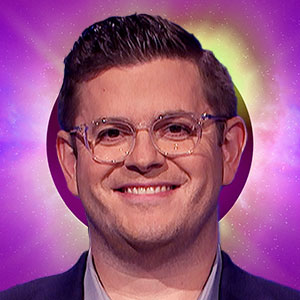

Trivia knowledge is obviously important, but you can’t go from mediocre to exceptional at trivia in the month between the call and your tape day unless you quit your job, forsake your entire social life, and devote no less than 16 (but ideally 20) hours a day to focused studying. For obvious reasons, I can’t recommend this. Instead, my prep was in areas where I could make huge leaps in a relatively short time, often with relatively minimal effort. I mentioned buzzer timing and wagering theory above, and others have written about clue selection and DD hunting, but one area that is definitely underrated is developing a sense of what I call “Jeopardy lateral thinking.” Since the turn of the century, sets have changed, hosts have changed, and question content has changed, but the style in which clues are written has actually changed very little. We can use this to our advantage!
Jeopardy! doesn’t often write clues that can only be answered with pure trivia knowledge – there are often “hooks” in clues that reference something more famous about the subject being asked. A clue about Abraham Lincoln may include some tough, obscure trivia detail, but often, Jeopardy! clue writers will include something else in the clue that seems relatively unimportant but serves as a hidden pathway to get the clue even if you don’t know the obscure trivia. A good way to identify this is when a clue is written in a way that, frankly, doesn’t make sense or isn’t how a normal person would write a clue. Find the word(s) in there that just don’t seem to fit and work from there! It’s tough to describe exactly how to study for this, so I would simply recommend going to the archive and reading, reading, reading.
— Michael Menkhus
Most important is to know yourself – particularly your learning style and how you train yourself to retain information. I found studying content to be helpful. In my three games I can point to one clue in particular that I wouldn’t have been able to pull had I not drilled on content, and at least a handful of others that I pulled quickly from repetition.
To bump my trivia knowledge, both in traditional Jeopardy canon and the more recent shifts to include more image-based clues, I studied the J-Archive, took a few dozen Sporcle quizzes per day, and I would drill some of the rote topics like Presidential order / number; state, provincial, and country capitals, etc. If you’re unable to simulate Jeopardy!, the Sporcle quizzes help build your recall speed and accuracy chops.
Lastly, acclimating yourself to context switching is important. The NYTimes (or any periodical / game center) daily games are extremely helpful in this regard.
— Will Weiss

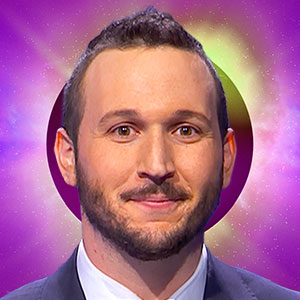
To minimize any future regret, make the plan as soon as possible as to what and how much you’re going to study and stick to it. Don’t get bullied by these nerds into turning your whole life over for this: there is no obligation to study, you may not have the time on top of other life demands, and if you’re good enough to get on the show you’re already probably good enough (knowledge-wise) to have a shot at winning. At the same time, each new thing you learn increases your chance of winning and there’s no shame in going full sicko about it and committing yourself fully to the pursuit. (Ha! Twist! I was a nerd this whole time too!)
— Zach Gozlan
Season 38 contestant, data enthusiast, and Pop Culture Jeopardy game winner as part of The Personality Hires
I’ll start off by saying that I don’t think there’s any right or wrong way to study. What works for one potential contestant might not work for another. For me, the best way to study was by watching the show because while you won’t know your categories until the beginning of each round, regularly watching the show gives you a good idea of the variety of questions you’ll be asked.
For any of my weak spots (e.g. U.S. politics, sports), I found Sporcle to be a fun way to learn the basics.
— Diandra D’Alessio

Tighten Up Your Social Media

The extent to which you should tighten up your social media depends on how comfortable you are talking to strangers online, both good and bad. No matter how your taping goes, there will be delightful people who are excited to see you, there will be people in the Jeopardy! community who are excited to meet you, and there will be trolls who think you’re the worst thing to happen to Jeopardy! since Mike Richards.
— rowan ward
I did not put in the bit about Mike Richards, but I also didn’t delete it.
The fact is that Jeopardy! is seen by millions, and perhaps 0.001% of those viewers are total turds that need to insert themselves into your consciousness. That said, 0.001% of 2 million viewers is still a healthy number of human turds. Everyone has to decide how to deal with it, but if it’s not something you want, best to lock it down ahead of time.

For most people, the Jeopardy! airdate is going to garner an unprecedented and often overwhelming amount of (online) attention. Those 30+ minutes of fame are going to be a lot, and that doesn’t even factor in the adrenaline you’ll feel when your episode airs.
Jeopardy! does advise on their social media packet that you lock down your profiles and accounts ahead of time. This is, in general, sound advice, and you should definitely err on the side of caution. That said, there are two main benefits to maintaining a public online presence in the wake of your Jeopardy! episode:
- Connecting with the Jeopardy! contestant community (most of us recent contestants are on Twitter, and there is a very active Facebook community, though that is locked), which is truly one of the most supportive groups out there. It is one of the few reliable ways to make friends as an adult.
- Being able to set the record straight / claim your own narrative. During my first game, I made a FJ wager that was very smol but very intentional/strategic on my part, and I had a feeling it might confuse a lot of people, or worse, I’d get mercilessly lampooned for it. On my game day, I posted my thought process / strategy on Twitter and the Jeopardy! subreddit as it aired, and the only flak I got was from a few randos here and there. Part of it is because with the moderation and rules in place in the J! subreddit, Redditors are far less likely to talk shit if they know you’re in the post (and even so, the mods are pretty quick about weeding out unkind comments). And I can attest that people are more likely to be empathetic when they realize there’s a real human being behind that Jeopardy! podium. And generally, if there are reply guys who insist on replying even after you’ve said your piece, that’s a good sign that you should go for the block. That said, you don’t owe anyone an explanation for the way you play a very difficult game show under the stage lights!
And of course, you have these downsides to leaving your social media profiles public:
- Trolls, creepers, reply guys, oh my!
- The exhausting amount of energy to deal with whatever publicity you get.
- Unnecessary commentary on your appearance and idiosyncrasies, including those you may not have even realized about yourself.
- And then some
So unfortunately there is no one-size-fits-all answer to how you should address your own social media presence, other than err on the side of caution. It is absolutely possible to maintain a visible enough presence such that you can easily connect with Jeopardy! peers and not feel unsafe, but there’s always the caveat that any public exposure opens you up to the possibility of seeing an errant unkind comment. With that said, here are some best practices:
- Don’t read the comments. Don’t search for your name. You will very rarely find anything good out in the saltmines that will possibly outweigh the awfulness the Internet can muster. If you really need to satisfy your curiosity, read through one funny comment with a friend as a treat. Friends/loved ones are always a good buffer should you ever feel the need to wade through the comments, but in general, nobody has ever regretted not reading the comments.
- Turn off your notifications except for people whom you follow! (Assuming you only follow people you trust / like.) You will definitely get inundated with a lot of notifications and it’ll be much more difficult to sift through them if you’ve got a bunch of randos (however well-meaning they might be) in your mentions. Focus instead on the support from your friends & fam!
- Lock your DMs to only people you follow / friend. There are a lot of people out there who have different ideas of what boundaries mean.
- If you really want to make your notifications as manageable as possible, limit your tweets and social media posts such that only your friends/mutuals can comment on them. I started doing this as soon as the Second Chance lineup came out, and it made things a lot less hectic during the airdate. It also ensured that no reply guy would be replying directly to my posts.
- If there are any posts that are advertising your Jeopardy! appearance (i.e. your alma mater’s alumni account, your local town’s FB page, your sibling posting about you), see if you can make sure that comments are well moderated. There are known commenters who comment on public social media posts with direct game spoilers.
- Make sure your contact info (address, phone number, email) is well-hidden. If you can Google it, so can a random creeper.
- This is already on the social media packet, but when you’re on Jeopardy!, you’re technically representing the show (and to a larger extent, Sony Pictures). Jeopardy! can technically withhold your prize money for whatever reason. Don’t let social media and/or a complete lack of self-awareness be the reason for that. The folks at Jeopardy! DO check social media channels and they absolutely check the Jeopardy! subreddit. If you feel like something Jeopardy!-related might be too dicey to post publicly, don’t be afraid to run it by the Jeopardy! social media team (Susie!).
- Don’t be afraid to block, soft-block, or mute whoever makes you feel uncomfortable.
— Cindy Zhang

As a person that lives in a small town and has a fairly generic look, I didn’t really expect to be recognized often, and that’s pretty much been my experience. The few times it has happened have been perfectly pleasant. I only mention it because it is by no means a given that your life or interactions with people you do not know will change in a meaningful way. Take any and all precautions you feel appropriate to protect yourself and your privacy, but apart from having a permanent icebreaker for any social function, don’t assume you’re going to be a big deal otherwise.
— Jared Watson
Trust yourself and if an interaction feels off, BLOCK/MUTE. Remember: you don’t owe any of these strangers and explanation or interaction. And you certainly don’t own them any personal information.
— Courtney Shah
J! 7x Champ, 2022 ToC, laughably described by Lilly as “serene” on camera


Also, I would recommend Googling yourself before your airdate. There are lots of scummy data scraping sites that have everyone’s personal information, including addresses and, sometimes, phone numbers. Fortunately, a lot of them have an opt-out option where you can get your information deleted, which I would recommend doing everywhere you can find.
— Mark Palmere

While you might be inclined to loosen up any security measures after your airdate, it is likely your show might rerun during the weekend and/or the summer, which often triggers a new wave of social media attention.
— Cindy Zhang
It may be helpful to note here that like Cindy there can often be new social media attention that might bring unwanted interactions. Maintaining those same privacy settings may be advisable for a while after your initial game date, due to reruns.
— Katy Rudolphy
S39 Silver medalist


LinkedIn is my only social media presence with my real name. I knew that it would be fodder for a lot of AI-generated or low effort news articles, so I took the opportunity to augment my job history with some trollish entries. I got a chuckle out of seeing some sketchy article describe me as a Chief Avian Optical Analyst.
I received a lot of connection requests and attention on LI after my air date. I rejected all of those connection requests, except anyone that I thought could actually make a meaningful impact on my career.
For the Jeopardy subreddit, it can be toxic. I made a single comment on my game day thread explaining why I made certain decisions and that was enough. Most people were supportive and the ones who weren’t can kick rocks.
— Mehal Shah
Because of my professional life, I’m cautious about my social media presence. I also think I’m fairly thick-skinned and can have a very high degree of sarcasm/snark after years in fan groups, but the comments about age and appearance got to me. J! Is a show for smart people of ALL ages, not a beauty pageant. Thankfully, I found the J! Community on Twitter and Facebook to be generally very supportive and I’ve made lifelong friends there.
As a Memphian (Memphis is a big small town), the number of people who recognized me from my shows shocked me. I’ve been shouted out at college basketball games, grocery store parking lots, and everywhere in between. I won’t lie, it’s a rush and overwhelmingly people have been positive. Trolls live in the dark recesses of the internet, but in real life, I’ve had nothing but positive responses.
— Verlinda Henning

I admit that I was hoping to get a few people recognizing me here and there from the show, especially after my second game. It didn’t happen and I mourned my D-List celebrity life not even getting started. It’s not that people don’t watch the show, it’s just that they aren’t primed to look for contestants on the street.
— Mehal Shah


…unless you make your one defining moment on stage your entire personality!
— Cory Anotado
Chill

I have no special insights into how to prepare effectively for Jeopardy!, since I actually cribbed most of what I now know about how to prepare well from other people who’ve contributed to this guide. That said, I think the single most important thing I did in the three weeks between getting the call and taping my first episodes was get into a zen zone where I cared enough about the show to want to play hard, but not so much that I risked psyching myself out on stage.
Here are some things that I think it’s important to remember while you’re getting yourself ready to play. First, you have already accomplished what is a lifelong dream for thousands of North Americans simply by virtue of being called to appear on the show. This remains true whether you end your one and only game in the red, or whether you go on a long run. Allow yourself to feel proud about making it this far, and keep that feeling of pride with you when you head to set for your tape day.
Second, recall that there are a million little things that may affect the outcome of your game that are completely outside of your control, and then put those things out of your mind as much as you can. Who you play against, how those players approach the game, how fast your opponents are on the buzzer, what categories you face, and where the writers have decided to place Daily Doubles can all have a significant impact on game outcome, and these things are entirely out of your hands. I personally find this quite empowering, since it severely limits the amount of things I have to think about during games, and it also reduces the amount of time I spend stewing during the weeks leading up to when I tape.
Third, remember that this game is not your life, and it will never be your entire life, even if you win 75 games and end up usurping Ken’s role as host as a result! One potential pitfall of taking preparation seriously is that you run the risk of losing sight of this reality. I would highly recommend spending some time during the weeks before you tape taking deliberate time to do things that are not related to Jeopardy! and that you find relaxing. I spent a lot of time on J-Archive in the weeks before my first tape date, but I also logged a shocking amount of movies on Letterboxd during that time! In the run-up to other tape dates, I’ve also done things like book spa treatments or visit friends in other cities to celebrate special occasions with them. What non-Jeopardy! activities are appropriate and feasible for you will depend a lot on what constraints are placed on you due to work or family responsibilities, and what your other interests are. I was a barely-employed 23-year-old when I was first on the show, so I had an unusual amount of time to allot to both loafing off and doing actual preparation. However, I think everyone can benefit from spending a few hours here and there in the weeks before taping trying to find their bliss.
I realize that this advice may feel out of alignment with some of the more practical tips shared by others elsewhere. I offer it because after meeting dozens of Jeopardy! contestants and other trivia folks, I’ve noticed that many (although not all) of us have some pretty strong anxious and neurotic tendencies that don’t always interact well with high-stress situations such as “taping a game show that will be watched by millions of people.” I say “game show” as opposed to “quiz show” most of the time when I talk about Jeopardy!, because I think it’s important to remember that the main purpose of the show isn’t to assess your worth and intellect as a person, it’s to provide some light entertainment to viewers. We’re lucky enough as contestants to get to be a part of that! Stay relaxed in the weeks leading up to taping, and you’ll be more relaxed once you get to set. If you’re relaxed on set, you’ll enjoy playing and provide a great show for the studio audience and the folks watching at home. And crucially, if you’re enjoying the game, you’ll likely also play better and maximize your chances at becoming a Jeopardy! champion!
— Mattea Roach
Total bozo when it comes to gameplay, Jeopardy! therapist to the stars, also won some games
Fully endorse what Mattea is selling here. I felt absolutely great going into both tapings, and in each case it was because I was coming in after a time of chill. In the first case, it was a slow time with work (which was WFH in late 2020) and there was literally nothing else happening in my life. In the second, I did isolation to keep from getting sick before the tournament, and that involved my husband being gone for three weeks beforehand. I worked, I watched Jeopardy! each night, I watched baseball, I did very light flashcarding to try to nail down some opera composers.
And I watched trashy television, read fun books, and played a bunch of video games. I used that time to allow myself to reflect on what I wanted to get out of the experience without thinking directly about it too much, and was able to approach the taping with more excitement than anxiety. At this point, I have probably thought deeply about Jeopardy! more than most people, but in the direct preparation the thinking needed to serve me in the moment.
— John “TK” Focht


I was excited to go, but not nervous. I taped in March 2021 so we were still in the throes of the pandemic and was just so happy to finally get the call. A little background–my first in-person audition was in 2008. Then I had another audition but never got the call. My third-time’s the charm audition was here in Memphis in 2018. I got the FIRST call in early 2019 asking me for available dates, which I provided, but then Alex got sick and then 2020 happened and I had finally written it off. In February 2021, the contestant coordinator called me and asked if I could be in LA on March 16 to tape. I FLEW out of the chair and screamed “YES!!!” without even looking at a calendar. I made it! As a life-long (Art Fleming J! era) fan, this was EVERYTHING! So I wasn’t nervous – I was just so damn happy!!!
— Verlinda Henning
If you are reading this, then appearing on Jeopardy! is probably something you have been looking forward to for a long time, so please make sure to enjoy the experience. Yes, it’s going to be stressful at times & you are going to be nervous, but always try to take a step back & take in the whole experience for a few moments. You’ll never forget the first time you walk into the studio & see the Jeopardy! board, or the first time your podium lights up after buzzing in. Just being up on stage & playing the game is so much fun, win or lose, as is spending the whole day on set with the Jeopardy! crew & your fellow contestants. You may even find that the more relaxed you are, the better you will play!
— Eric Ahasic


If you are reading this guide, your biggest challenge will not be “knowing enough stuff.” You made it through selection; the test you took was a pretty fair representation of the kind of stuff that you need to know. Your main challenge is now to master your emotions. Do not neglect this part of your preparation.
Take time to be alone, think about what you are about to do. Visualize yourself on stage. Set goals, but make them small. If you go in thinking you only goal is to win, and anything short of that is a failure, I can guarantee you will have a terrible time. I set myself a series of progressive goals: Get a clue right. Call a category and clue. Find a Daily Double. Say “True Daily Double.” Have a nice chat with the host. Make it to Final. Win a game. Each of those little goals is a victory: think about savoring each small moment. Think of mountain climbers: they anchor themselves to the rock at regular intervals so that if they fall, they only fall as far as the last anchor. An all-or-nothing attitude going into a game is climbing El Capitan “free solo:” if you fall, you fall all the way down. That is going to hurt. Set your anchors, climb the mountain, and enjoy the view.
— Luigi de Guzman
As someone who is outcome-driven by default, reprogramming that setting was difficult but necessary in order to get to a state of play. Why are we there? To play a game and have fun. There are more things out of your control on your tape day than are in your control. Once I felt like I was as prepared as I was going to be, I said, “F- it. That’s it. Let’s go. Have fun.” My first day was spent as an alternate. I didn’t participate in any activities. While that stung at first, I was fortunate that another contestant was also an alternate. We ended up viewing that alt day as a gift and an opportunity to learn. The next day when we both played, we knew what to expect, and that helped settle some nerves.
— Will Weiss


I am a goal-setter and thought a lot about goals for the show. “Win X games” is not a good goal. You might get the worst possible board for you. You might be against a total buzzsaw. You might be a buzzsaw yourself, but run into the worst possible opponent for you. Lots of great champions, including Ken Jennings, nearly lost their first games.
Here are goals that I set for myself, that were specific, measurable, and achievable.
- Wager aggressively when I had the opportunity
- Have a large number of buzz-in attempts
- Don’t finish in the red
- Troll Ken
- When my daughter is old enough to watch and understand the show, I want her to say “Dad tried his best and was kind”
I look back on my brief run with satisfaction because I believe I was able to do these things.
— Mehal Shah
On Imposter Syndrome
I have the worst imposter syndrome in the world. Or wait, probably someone else does (groan). It’s really easy to feel like everyone knows more than you do, is faster than you, more confident than you, etc. But here’s the thing, almost everyone you’re looking at with awe is feeling the same way about you! As you watch from home or the Green Room it’s easy to get bogged down by all the questions you see other people getting right that you would have missed, but you have to remember that there are plenty you’d be the only person on stage buzzing in on. You passed the test, you made it to the stage, that means you have every right to be there. A key piece of advice someone gave me before my first game was to play with the confidence of a mediocre dudebro, and as silly as it sounds, it totally worked for me! Trust your instincts, play your game your way, and put all the good stuff you’ve learned in this contestant guide to use. There are no imposters on The Alex Trebek Stage.
— Alison Betts


Carlo Panno was a contestant on Art Fleming’s Jeopardy! before eventually becoming a writer for the current incarnation of Jeopardy!. Listen as Christian Carrion interviews Carlo about his experiences in front of the camera in New York, and behind the scenes in Los Angeles—there’s some helpful hints and tips about Jeopardy! in this episode of Tell Us About Yourself: Conversations with Game Show Contestants, produced by BuzzerBlog in conjunction with the National Archives of Game Show History at the Strong Museum of Play.

The Day Before Your Tape Day
Understand Your Body

The most obvious part of understanding your body is understanding what your relationship with food will be on the tape day, and that will guide your thoughts on what to take to the studio. You’ll have whatever food and drink you bring with you, whatever options they provide for lunch, and access to water. (Note: This is based on experience in 2020 and 2022, and the show may begin to provide more food over time. You’ll still want to think this through.) You’ll have set times you can eat and drink, and times when you can’t. You’ll have set times when you’ll have access to the restroom. You want to make sure you’re able to be physically comfortable and alert at a moment’s notice in a situation you’ve never experienced. It’s tough!
For me, this body relationship meant that I needed to rely on foods I knew wouldn’t upset me physically. I had dry cereal and dried fruit for breakfast. I’m not normally a breakfast person, but I needed the energy and lunch would be at an unpredictable time. I chose a lunch that would sustain me, but not overly fill me. The first time I taped I found I really missed having caffeine available, so I brought some the second time – but this was a tradeoff as it was also likely to throw off my digestion and so it needed to be used in moderation.
This extends beyond food. You’re going to experience a lot of emotions, and our physical being has a lot to do with what we feel and how we’re able to react. Think a little about when you feel your physical best to do stressful activities and provide yourself with a strategy to get yourself as close to that as you can.
— John “TK” Focht
Since I taped in March 2021, I brought enough snacks to support the entire contestant pool! But they came in handy as we stood in never-ending lines to enter the studio, etc. For my body in general, I’m used to long hours and tight deadlines with constantly-changing expectations (thank you, Human Resources!), so the day itself wasn’t that stressful for me. I hated the (necessary) isolation–I would have loved to visit more with my fellow contestants.
— Verlinda Henning


This all goes for caffeine too. Fritz Holznagel’s buzzer book identifies caffeine as one factor that assists with buzzer time and I think this is true. I tended to lag later in the day because I’d been nervous for so long and didn’t sleep well for the last 1-2 nights. So, bring some canned coffee if you want and pace yourself throughout the day. Don’t chug them all in the morning because you’ll have a long orientation and you may not get called up to play for several hours.
— Zachary Newkirk
Pro tip: Don’t get the Trader Joe’s canned coffee. It’s awful.
— Brian Chang


If you can, bring the things you know work for you in terms of keeping you awake, peppy and energized. I should’ve brought more Diet Coke because as the fourth game taped that day, especially after lunch, I was dragging and adrenaline only does so much. Don’t count on being able to get a coffee or whatever you like whenever you want.
When I was on the show, we were in COVID protocols, so there wasn’t a green room per se we could have drinks or whatever, but the bigger point remains—if you know your body well enough that you know a bottle of Diet Coke is what you need to keep energized, don’t leave it to chance, bring a bottle of Diet Coke with you.
— Cory Anotado
I’m a nervous non-eater, which is a bit of a problem if you win and have to come back the next day! I stuck with banana, crackers, dried fruit, and light snacks that allowed me to keep up the energy enough to stand upright but not make me sick. As a soda drinker who doesn’t like coffee, I definitely needed the caffeine and wished I had had a little more.
— Courtney Shah


Something that hasn’t been mentioned with body preparation is the toll travel takes on the body and mind. A piece of advice, especially for contestants traveling from the East Coast, is to fly out 2 days before your prospective tape day. For example, if you’re asked to be available for a Tuesday taping, fly out Sunday. If Wednesday, fly out Monday. In my case, the tape day(s) were Wednesday-Thursday, so I flew out on Monday. This strategic move allowed me to adjust to the Pacific Time Zone and perhaps more importantly, to establish a routine to be followed for however long I’d be out there. The “off day” also gave me an additional day to cram / study / take some quizzes and build a mind/body plan.
I looked at the trip and appearance like an athletic competition and created a regimen accordingly. I woke up at the same time each day, worked out at the same time, ate breakfast at the same time; even ate the same selections from the buffet. The workouts were key. I knew it would be a long day. I could be standing up for several hours. I’d need to stretch, I’d need to hydrate. I’d need to build endurance. In short, if I was physically ready, I could more easily Jedi mind-trick my way into thinking I had a mental edge.
Also important: while at the studio, your lunch selection. Food for fuel is the safest approach. The commissary has many great options, but be careful not to overeat or to eat anything too heavy. Be careful about drinking carbonated beverages.
Following up on others’ points about caffeine, I offer a counter, as a several-cups-of-coffee per day drinker. I opted to only drink coffee in the morning with breakfast, and drank water exclusively for the rest of the tape days to avoid crashing.
— Will weiss
For the local contestants, it can be hard to be in real life mode one moment and then in Jeopardy mode the very next. The night before my first tape day I was helping kids with homework and shuttling to basketball practice while half-heartedly attempting to list the presidents in order. My kids, who did not know I was taping, accepted this as normal Mom weirdness. In fact, just as fatigue won the battle against nerves and I was finally drifting off to sleep, one of my kids came into my room and woke me up because of a misplaced something or other that he absolutely needed that moment. The next morning I was so frazzled I left my five spare outfits at home and had to make the split second decision to go back and grab them, risking being slightly late for the call time. I almost didn’t, assuming that even imagining I’d need a change of clothes was the height of hubris! In light of all of this, if you are local, it might be worth considering at least one night in a hotel close to the studio. Having a little island of time and space just for yourself can be very centering! Of course, you know yourself best, so if you think you’d be your best self after a night in your own bed, that’s great too (especially if you haven’t birthed miniature human alarm clocks!).
— Alison Betts

When Your Tape Day Is Too Soon To Play The BCP Shuffle
Note: Several of our assigned-female-at-birth contributors collaborated on this section.
So you got the call, you confirmed, and you excitedly went to mark the day on your calendar. But help, you’ve realized you’re expecting something else to happen on that day! Perhaps your tape date is too soon to use birth control pills to skip the period, or maybe you’re just not a fan of hormonal birth control. Either way, you know you are going to have to deal with the Crimson Tide while on the Alex Trebek stage, and you’re terrified of what that might look like. Have no fear, other menstruators have been there, done that, and have some tips to make your period the last thing on your mind.
- You WILL have access to a bathroom in the Green Room, and even if you’re a returning champion, you’ll have time to use it in-between episodes. It’s a private toilet with a fully closed door right off the Green Room.
- If you are dealing with an especially heavy situation, consider doubling or even tripling up on protection (tampons x pads x period underwear?) Sure, it’s overkill, but if it means you don’t have to worry about this on a day you’d rather be worrying about playing some killer Jeopardy, it’s worth it!
- The contestant coordinators are your friends here! If you feel you need a chair for any reason, including cramping or period fatigue, they will make sure you have one. Don’t be embarrassed to advocate for yourself.
Above all, relax! It’s never fun when the world’s worst subscription service is going to collide with a major event, but with these tips in mind you can make sure the visit is as minimally annoying as possible.
What To Pack
For your trip, bring as much of your nightly routine as you can with you. The more you can make the night like any other, the more sleep you will get. (Expect to have minutes of rest, not hours.) Again, we want Couch Brain here, so the more it can be like an average day, the better. Don’t forget to pack everything you need to bring to the studio.
What To Bring To The Studio
Bring at least 5 outfits, ideally with as many interchangeable parts as possible. Bring some snacks (trail mix, protein bars, whatever you like) and something to drink. Be prepared for the possibility that the show will only give you food or drink during the lunch break. Make sure you are comfortable wearing whatever outfit you wear in the 60-degree weather you will experience inside the studio. Be bold about having a suitcase on set with you—everyone will have them, might as well have your stuff.

Bring a pair of comfortable shoes along with whatever pair of nicer shoes you might want to have for full-body shots. If you’re lucky enough to play in multiple games, you will likely not want to wear dress shoes all day long.
— Mattea Roach
Seconding Mattea’s advice here. By day two I knew the studio was cold and that you wouldn’t see anything I was wearing below my waist, so while I wore a cute dress I had warm leggings and sneakers on underneath! Bring clothes you’ll be comfortable in and one pair of nice shoes for your first game or any publicity shots, but other than that remember to prioritize your own comfort. Also, if you wear a dress that doesn’t have a sturdy belt, you should bring your own for the mic pack. I brought a rather ugly one thinking it wouldn’t show, and in most games it didn’t, but if you are short like me you may be lifted up to the rafters and your belt will be visible, so plan accordingly!
— Alison Betts


I’m really tall, and my personal idea of hell is most women’s dress shoes, so I wore a pair of black flats both days that looked nice and were also comfortable.
— Verlinda Henning
I wore black flats for my taping, which was fine for the first couple of shows. But I really wish I had had more support as the day kept going. Jeopardy! can offer a seat if that is better for your physical limitations.
— Courtney Shah


Sure, most prep should focus on gameplay. But make sure to set aside some time to think about your wardrobe. Something you probably aren’t thinking about is your first outfit will be what you wear for your official photos, both at your podium and with Ken. Many contestants (myself included) make these our profile photos for pretty much everything, both personally and professionally. So think about what you want to be wearing. If you’re a man, do you want to wear a tie? Sweater or suit? If it screams “you,” then it’s the right answer. If you’re a woman–actually scratch that I’m not going to mansplain how women should dress.
— Mark Palmere
Things that the Jeopardy! wardrobe packet doesn’t necessarily clarify:
- The TV camera can pick up patterns and textures in a way that makes for terrible TV. These include (but are not limited to): ditsy floral prints, thick-knit fabrics, ribbed textures, pin stripes, etc. They may ask you to change or wear something from their own wardrobe.
- Avoid super light (close to white) colors, as these can be very blinding.
- Jewel tones are recommended because the color saturation ensures they won’t appear “dull” on screen. However, the TV camera does mute a lot of colors, such that your forest-green shirt may look like the color of split-pea soup. Green is one of the riskiest colors you can wear; it is unfortunately a color that, when muted, appears differently than intended. Purples will take on a more bluish/navy color. Blue comes with the risk of blending into the Jeopardy! stage.
- Jeopardy! has been less strict about pins in the past few years. That said, if you do wear any accessories with lettering/wording/symbols, you will have to hand it over to wardrobe/legal for inspection.
— Cindy Zhang


If you wear a tie, consider a tie bar to keep it in place. Wardrobe will tape it down. Also, in case you do go on a run, having a few ties will make your wardrobe seem more varied than it really is.
— Luigi de Guzman
They’re not kidding about the studio being cold – the sweater I wore in my first appearance was to keep me from freezing to death and I incorporated a jacket in my second outfit to make sure I’d be comfortable. You likely won’t be seen from the waist down, so don’t be squeamish about wearing comfy shoes, and you probably don’t need to wear shapewear if it’s uncomfortable. You want to look good, but also be comfortable.
— Eva Thomas
two time silver medalist, self proclaimed Danny Vogelbach of Jeopardy!


I wore Hokas on stage. TV audience doesn’t see your feet unless you’re on podium 3 and they’re visible in a wide pan shot pre/postgame, and if they want to be mean about that, let them. I’ll stay perfectly comfy, please and thank you.
— Michael Menkhus
I wore the same pair of trousers (I brought a spare pair just in case), and brought plenty of tops to choose from. Avoid turtlenecks because of the mic placement. But more than anything, wear outfits that make you feel good, because it’s a huge confidence boost!
— Diandra D’Alessio


Whatever outfit[s] you plan to wear, you should try to practice in! That might mean standing in your blazer while you watch a couple episodes and buzz in with your clicky pen, or it might mean wearing an outfit you like and are comfortable in from your regular/professional life. Agree that you want to prioritize comfort for your shoes.
Also, as someone who doesn’t regularly wear makeup, I found the wardrobe packet instruction to wear the makeup you would wear to a wedding/other nice occasion very daunting! Despite the best efforts of a nice lady at Ulta, my makeup skills really did not improve at all by tape day, and frankly this effort was wasted time. The good news is, this doesn’t matter! Jeopardy has lovely and highly-trained makeup professionals, so if that’s not a skill of yours, you can just let them take care of it.
— Xanni Brown
If you wear a red tie, know that some people will interpret that a political statement. It’s my only regret from my second game.
— Mehal Shah

COVID Tests
Editorial note: the first version of this guide was written during the throes of the COVID-19 pandemic. Currently, Jeopardy!’s COVID protocols are no longer in place, so the importance of this information is archival more than anything else, and I hope in the future, that maintains to be the case.
Complete the COVID test form before you fly out; they usually email it a few days in advance. It doesn’t take long, and they can’t administer the COVID test unless you’re registered for it and have gotten a QR code to bring to the test.
The COVID test happens the day before. (It’s a good idea to test yourself before you fly out, though they no longer require you to send them a PCR result before you fly out.) There are two test time slots, at 1:00 p.m. and 4:00 p.m. It’s in the parking deck on the Sony lot, and you’ll go in the same entrance you use on tape day. The COVID test is an excellent chance to get a handle on where you’ll go the following day. One of the producers will meet you and tell you where to go. You’ll show your QR code, they’ll stick a swab in your nose, and you’ll be ready to go.
Last Things To Do
One piece of advice I give all the players I’ve worked with is, “Save your brain for buckets.” This phrase was born from an interview where basketball player Malik Monk explained that he had no tattoos on his right arm because “that arm was for buckets,” but it is based on ego depletion and mental fatigue. As President, Barack Obama liked to explain how he routinized every part of his day that wasn’t “making Presidential decisions.” His closet only had gray and blue suits, neutral shirts, and ties, so he only needed to grab a hanger. He never expended a calorie thinking about his clothes, his food (his staff liked to call him “Barry Seven Almonds” for his stripped-down eating habits), or his schedule. All of his mental energy went to the job. There are more in-depth principles you might remember if you read Daniel Kahneman’s “Thinking Fast and Slow,” but now is not the time to read that. The takeaway is that your conscious mind (ego) spends every day in an exhausting battle with your lizard brain to be your best. You can wear out your ability to make your best decisions over a day with a parade of distractions and engagements, and that’s one of the battles you don’t need to fight on stage.
In the same way, on the day of your game(s), you will want to save as much of your brainpower for the game as you can. One part is that I make all my decisions the night before. I pick out my outfit. I pack my day bag. I lay out my breakfast. The next morning I will get up, eat what I planned, put on the chosen clothes, and walk out the door. On the day, I strive for the Zen state of mushin, or “no mind.” Just being. What I’m not doing is thinking about work, social media, if I have enough clothes, what I will eat, where I will go after…all of that I already took care of. I’m just in the game. You might have a very long day ahead of you, and many champs see their streaks end on Friday, the last show at the end of a very exhausting day. So take that time the night before to take care of your future self and save your brain for the “buckets.” As a bonus, having this simple list of rote tasks to do the night before will help you get even a few more minutes of precious sleep.
One other unusual thing, which I don’t necessarily recommend, but is worth sharing as a statement of how far I took it: When I won on Master Minds, I actually took a nap in the green room, using my suitcase as a pillow and a spare shirt as a blindfold. It was a byproduct of the sheer exhaustion of waiting and waiting and waiting, but even thirty minutes of downtime did wonders for my brain. Before Second Chance, I did the same thing: I laid out in the champion’s change closet for about half an hour until the contestant briefing started. I didn’t get as much sleep, but just taking my energy level down to “idle” for a bit was incredibly useful. (I like to think taking a nap when everyone else is nervous as hell is intimidating, but I doubt anyone noticed.)

I actually have a set of pictures from a full week before my tape day of trying on different combinations of shirt/tie/jacket/pocket square to lay out the clothes so that I would have everything planned and not have to think about it. That and I was desperately bored.
— John “TK” Fockt
What To Expect On Tape Day
Hurry Up… and Wait
Your initial call time will be early, so you will wait in the parking deck. When everyone is there, you will move onto the lot into the waiting area (at the time of this writing, this was the Wheel of Fortune studio). From there, you will wait again until the COVID officer briefs you on procedures, and you will wait again until you have more paperwork. And you will be doing virtually all of this and more without the distraction of your phone available. Just be prepared. Bring some flashcards or playing cards. The goal in all of this waiting for you is to manage your energy and be ready to be your best when the time comes; what you don’t want to do is spend the whole day with your adrenaline blasting away and then come out to the stage exhausted.
No Sleep

You will NOT be able to sleep the night before. The night before The Chase, I ate a huge dinner then popped a couple melatonin gummies and forced myself to go to sleep. The night before Jeopardy!, I drove to Huntington Beach and had tacos with a good friend and got to where I was staying around 11 PM. Guess which game show I won?
— Cory Anotado
Sleeping the night before Jeopardy! can be hard. The night before my first tape date, the difficulty sprung from a combination of nerves and being a night owl. In that case, I had to get tired, but listening to some guided sleep meditations did help wind me down before I finally dozed off.
The night before Second Chance, I got very little sleep because I did go to bed early but my dinner made me ill and kept me up for hours in the middle of the night, even though I had eaten something I’d eaten without a problem many times. That’s harder to deal with, but…even if that kind of worst-case scenario happens, keep your cool. Take a shower, and listen to something that feels cozy. If it’s a trivia podcast, fine. If it’s a silly TV show or music or something, fine. Just listen to something that helps you feel comfortable and tries to keep your mind off of the fact that it’s a worst-case scenario, and keeps your body and mind ready to sleep when you’re able.
— rowan ward


If you are someone who uses a sleep aid with some frequency (melatonin, cannabis products, prescription sleeping pills, whatever) and can do so without feeling drowsy in the morning, I highly recommend using your sleep aid of choice the night before you tape. I am a terrible sleeper at the best of times, and having some assistance with falling asleep and staying asleep makes a huge difference in my readiness to tape. Conversely, if you do NOT regularly use a sleep aid, the night before you tape Jeopardy! is probably not the time to start.
— Mattea Roach
Sleeping in and missing the reporting time was the thing I was most freaked out about. I had alarms set on my phone, the hotel clock and anywhere else it was possible. Usually I sleep like the dead, but that night before taping was not very restful. The best thing I did was finally just get up, shower and get dressed. It got my brain in the game and ready for the day.
— Verlinda Henning


Even if you find yourself unable to sleep, lay down horizontally and close your eyes for at least a couple of hours. You may find yourself dozing unexpectedly, but even if you don’t, a couple of hours of rest is better for your body and your brain than staying up doing things.
— Miranda Onnen
COVID Tests
Editor’s note: again, while Jeopardy! no longer has COVID-19 protocols in place, we leave this section in as a historical reminder of what many contestants had to go through during their appearances, and hope no future contestants need to do likewise.
One key thing to remember: Your goal is to test negative for COVID. Your goal is not just to feel well or not be affected by it. You need to test negative. In the last few days, before taping, bubble-wrap yourself. Find your most germophobic friend and do what they say. This is one time you aren’t being paranoid!

COVID test results are emailed overnight. Hopefully, you will be asleep by the time it comes in, so you will check it in the morning. If you’re up in the middle of the night and check your email late enough, it’ll be there. The result will make you click a link and log into their portal to see the result. If it’s negative, you’re good to go.
— rowan ward
Contestant Briefing
Now it’s time to really get to know the contestant producers. This is one of several production teams within the Jeopardy! family, but the job of the contestant producers is to get high-performing contestants on the stage. Their job is to get you there looking and playing your best. They have no idea what the questions will be – the writers create the games, which are chosen randomly by the Standards and Practices team.
(One thing you will learn – rigging game shows is a federal offense, and the one thing that would definitely kill the golden goose that is Jeopardy! stone dead would be a game-fixing scandal. As a result, the way things happen regarding who plays whom in which game is a bit Byzantine, but it’s set up to make it impossible for them to rig it if they want to. It also means they generally have less of a plan than you might expect at any given moment.)
But on the lot, the contestant producers are your friends. They are the ones that are there to make you shine, and they do it 10+ times a week, every week. They are very good at it, and they’ve seen everything. Don’t be afraid to ask them for whatever you need. You are not interrupting them. That’s their job.
But your first introduction will be The Contestant Briefing. Here the rules of the game, in every painful detail, down to the last comma, are explained to you. For every possible scenario, weird tie, or strange thing that might happen, they have already worked out the scenario and have a rule. And now you have to hear it. All of it. Get comfortable; this will be a while. They have to do it; you need to know it.
Practice Game
Next will be a trip to the Alex Trebek Stage and the practice game. They will play through one full game, through which all the contestants are cycled (so everyone gets to play about a fifth of a game), but you get a chance to stand behind a lectern, ask for categories, and press that buzzer. This is a great—but brief—time. Your goal here is to get yourself as comfortable as possible as quickly as possible.

I can’t emphasize enough how quickly rehearsal goes. It is not a substitute for buzzer preparation and definitely not a substitute for studying material. I am fairly sure the rehearsal game questions are purposefully easy, which helps players get comfortable.
— Zachary Newkirk
This is your first real chance to apply that buzzer timing strategy. Don’t get bothered if it doesn’t work right away. You’re learning, and so is everyone else (except maybe the champion, and even then they often are as well). The contestant producers will tell you if you’re consistently early or late. Don’t panic if you are! Use it to mentally adjust what you’re doing. You’ll come back better.
— John “TK” Fockt


The rehearsal is not indicative of your in game performance so don’t let it affect you one way or the other. Just use that time to get comfortable with your positioning and familiarize yourself with the space.
— Miranda Onnen
Wait Some More
Now it’s back to the waiting area. Eventually, the contestant coordinators will draw names, and the first batch of contestants are called up for microphone, makeup, and final fashion check. Then they will eventually come to the studio, which will begin the roughly hour-long process of making 22 minutes of television.

You have no control over when you get called, so when I heard my name called for the first group, it was surreal. I knew it was real, but to be summoned to get ready for air was when it HIT. That was the biggest moment of nerves I had.
— Verlinda Henning
Wait actively. If you’re not called to play the Monday game, it is a good idea to keep your head in the game while the other players are going. You can watch the games going on before yours on closed circuit television from Wheel of Fortune. Pay attention, get used to reading the clues, making the buzz decisions, and pretending to buzz while you watch. It locks you into the host’s rhythm, and it keeps your brain in the mode of processing and responding to clues. That way, your brain should be in game mode even if you’re called later in the day.
— rowan ward


If you need to use the restroom, USE THE RESTROOM. There’s no real chance after this until the game is over.
— John “TK” Fockt
I CANNOT CO-SIGN THAT ENOUGH.
— Courtney Shah


I can’t guarantee that you’ll always get time for this since the contestant producers have lots to keep track of and many people to wrangle, but if you are a smoker, you’re allowed to ask for a smoke break. If you think it will be helpful to you, it doesn’t hurt to ask!
— Mattea Roach
Getting On Stage

Orient yourself on arrival. You’ve been shown all of this in practice, but now you’re doing it for real, from the podium you’re actually going to play from. You’re going to be looking mostly at the board itself. The scores are to the left from the top of the board. There’s a monitor underneath them for video clues (for video clues, the full text of the clue may only be on that monitor, as the clue might be too long for the screen on the board).
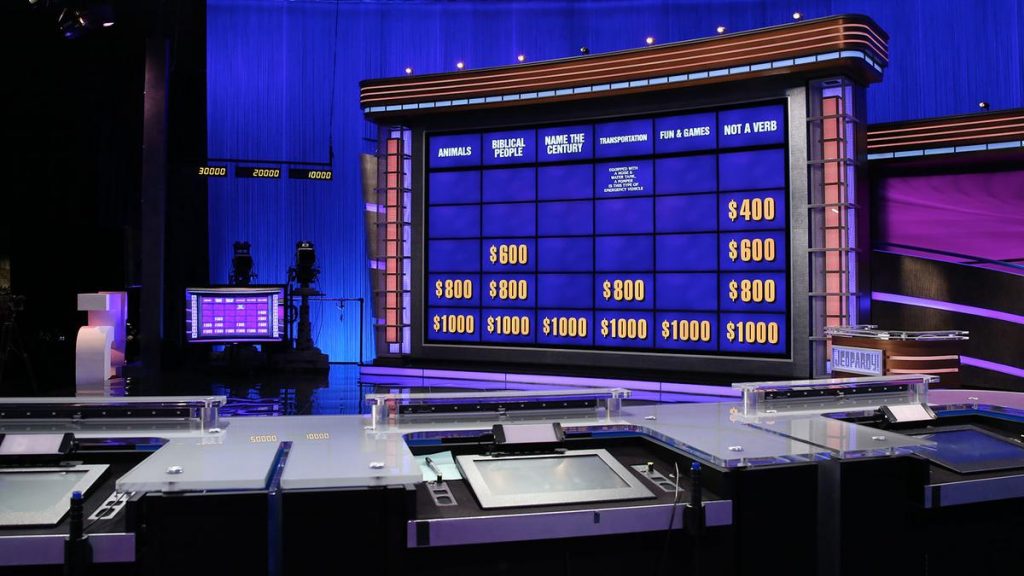
Production will have you write your name on the screen. They’ll touch up makeup. They might raise the floor underneath you so that everyone is closer in height. Most of these things have nothing to do with you, so just let them happen. You’ll be told when you need to do things such as smile or look in a particular direction. Otherwise, stand and try to feel as comfortable as you can. Take in the memory of standing here; it’ll be hard to do during the game.
— John “TK” Fockt
The rehearsal game will be the first time you actually get to be on stage. Do not worry about how you play in rehearsal. Your main job now is to learn the stage and the setup. Above all, you need to learn where you are going to put your eyes. There are 3 or 4 places you will need to train yourself to look: the clue board (to read the clue), the video clue monitor, the scoreboard (overhead– now you know why so many of us look like we’re looking for divine help when we hit Daily Doubles!) and, crucially for me, the host’s lips (to focus on when he stops talking). Get used to moving your eyes around, pick up each of those spots.
— Luigi de Guzman


I had really messed up my back before going on and wished I had known that asking for a chair was an option. You can sit on stage if you need to, and I recommend taking advantage of it if you feel you cannot stand for the full taping session
— Miranda Onnen
If you need an accommodation (e.g., chair during break, extra water, etc.), don’t be shy about asking for it. The contestant coordinators would love to help make sure you have what you need to perform at your best.
— Brian Chang


If you are short and your co-competitors are tall, you may be raised up very high on a platform behind the podium. For both my appearances I was raised about a foot in the air. If this is the case for you, comfy shoes are doubly important, and don’t wear heels if there’s a risk you might lose balance.
— Eva Thomas
First Leg
Lights down, and here comes that theme music, and Sarah Whitcomb-Foss introduces you to the audience! (Johnny Gilbert records his voiceover later from home; he’s not in the studio) The host comes out with some patter, comments on the champion, and introduces the categories. It’s time for the first 15 clues. This is your chance to get your feet under you and start playing for real, but it’s also a shorter segment, so you can settle in and get feedback from the contestant producer. It’s easy to blink-and-you’ll miss it, but use these first 15 questions to find your rhythm. Champions will be Daily Double hunting and trying to get most of the value off the board when their experience advantage is at its greatest. Don’t worry about that. Just play the game you’ve played dozens of times. This most significant surprise once you settle in: you know how to do this. This only difference is how frustrating having other people on the buzzers can be. Shake it off, and do what you always do. These first clues will be done before you know it, so get in your groove now.

Kind of a no-brainer but worth mentioning: in my very first game, I looked directly into the camera while buzzing in and answering. When you buzz in and get called to answer, either look at the board or Ken.
— Diandra D’Alessio
One thing they don’t tell you is that when Sarah introduces you, you can do anything (within reason) that you want (e.g. wave, dance, make a meaningful hand gesture). This is something you can plan in advance if you want to do something you think would be endearing. On the other hand, there’s nothing wrong with just standing (or sitting) there and smiling
— Mark Palmere


It’s not going to feel real. You are not used to watching Jeopardy! from inside the TV like this.
— Zach Gozlan
Don’t even look at the scores. Buzz in, answer when you can and move on. I had virtually no awareness of the score in the first round.
However – the first break does give you one opportunity to precompute some answers if you are up for it. For “all the letters in this word” clue, this can be a real advantage. In my first game, I used this time to predict 3 out of 5 answers that came up. If anagramming is a strength for you, this is the one low-pressure time to use it.
— Mehal Shah

Pickups
Whew! That went fast. The host looks down at questions, intently listening into their earpiece. What’s happening is that the video producers and judges are going through the clues to make sure that the host’s read was correct and all answers were correctly adjudicated. Sometimes, some of the reads get flubbed, and the host will reread the incorrect clues so those can be edited into the broadcast seamlessly.

You’ll be reminded during these breaks that you have water at the podium. Drink it if it feels good to you to do so. I enjoyed having something to do.
— John “TK” Fockt
It’s possible that during the pickups, a contestant coordinator will tell you that you’re buzzing in just a little too quickly or a little too slowly. This feedback does not happen often, and if you receive it, do your best to make the adjustment. They don’t make those suggestions lightly.
— Brian Chang

For my own part, when I came back for Second Chance I asked at EVERY opportunity what they were seeing. (The answer was always “You’re too early.”) All the feedback helps! In my first Second Chance game, I was getting absolutely smoked on the buzzer in the Jeopardy! round, so, like a baseball player, I “stepped out of the box” during the breaks, took a few steps, faced away from the audience, looked at the back wall of the set, and reset my nerves. I asked myself “what am I going to do differently?” the answer: Relax, let the game come to you. Slow. It. Down. Once the game resumed, I got a little better, and just in time for the Double Jeopardy! round where my buzzer power came back to me. But the key thing is not feel overly-rooted on that riser they make you stand on during the game. Having that freedom to pull back, rethink, and reset is important, and it’s all too easy to lock yourself into a bad groove and have the game be over before you even thought about it.
Interviews

It’s the show’s job to help you look good. You’ve filled out so many prompts for possible interviews by the time you’ve gotten here, and you’ve agreed on one of them because they think it’ll work, and they know. Just talk like you’re having a very short conversation and let the host help you from there. It helped me to have a key point that I was trying to get to efficiently the first time I spoke each interview, and then I could react to the host’s response more naturally.
Ask yourself what stories you like to tell people at parties. What stories can you tell in a short period of time make your friends (or random strangers) laugh, gasp, or react? If it’s a (safe-for-work) story that you enjoy telling and one that tends to get a rise out of the people you tell it to, chances are that it’s a great Jeopardy! story. And, bonus? That experience telling the story to people before means you’re more likely to sound great telling it on the stage when the cameras are rolling.
— John “TK” Fockt
PRACTICE! I was lucky enough to have actor/dramatics friends who coached me on my stories. They need to be engaging and they need to be BRIEF. When I was filming, several other contestants had to re-record their interviews to make them shorter.
— Courtney Shah


I second this! I didn’t prep my story at all and ended up stressed that I said something wrong in the months between taping and airing.
— Miranda Onnen
I tripped over my words a bunch the first time, asked if we could start over, and we did. It’s not a big deal and they’re surely used to it after 41 seasons of anecdotes.
— Zach Gozlan


The interviews were one of my favorite parts of the show, because you learn about your fellow contestants and you get to share a meaningful story for you. On my day 2 appearance, my camping out at Twilight movie premieres will live in sparkly infamy and I love it because it’s so authentically me! Pick a story (stories) that are the essence of YOU. My day 1 story was about how my mom and dad met during WW II–that framed my age and heritage and really sums up who I am. Since my parents are both dead, that was a way to honor them and have them present with me.
— Verlinda Henning
Agreed that authenticity is most important when choosing an interview story. Finding “fun facts” about yourself can be like pulling teeth, but when narrowing down your stories, try to find the one that can more likely point to you. A certain degree of specificity is great for anecdotes, because it creates a more vivid, compelling story that sticks with you.
For example, one of my stories that Jeopardy! wanted to pick about me was about how I like to travel and I’ve been to X countries. Sure, that’s an interesting enough fact, but 1) who doesn’t like to travel, 2) that story format has appeared on the show multiple times before, 3) it buries the lede for a lot of other more interesting anecdotes, such as the fact that I love finding hyper-regional Kit-Kat flavors that started from my time living in Japan. And now people associate me with Okinawan sweet potatoes.
Anyway, point is, good interview stories tend to have details that stick with you. If you’re struggling, try taking one of your answers on the contestant interview packet and take it to a higher degree of specificity such that it is uniquely identifiable to you.
— Cindy Zhang


Ask family members/close friends what they would say is a fun fact about you. That might trigger something that you don’t think of as interesting or engaging, but that others do. (My dad gave me my best anecdote.)
— Courtney Shah
When picking stories, remember this isn’t a job interview. You aren’t trying to impress people with your accomplishments, you’re trying to give them a brief idea of who you are. In the green room, the contestant coordinators will give you a card with five stories culled from the packet you respond to and ask you to pick your favorite, but you can always ask if what you really want to talk about isn’t there. For my second game, I asked if I could talk about how my now-fiance brought her dog to our first date even though it wasn’t on my card, not because it was the most exciting or funny story (it absolutely was not either), but because I wanted to talk about things important to me, not brag about how many states I’ve been to or where I grew up (both things on my card). That said, a funny story can go a long way (I just didn’t have any)!
— Mark Palmere


As of Season 40, the producers have been letting you pick your favorite anecdote ahead of time, so that relieves a lot of the pressure. When in doubt go for a story that is short, sweet, and if at all possible, funny! Hearing the audience laughing can be a great stress reliever, and Ken is amazing at picking up and running with humor.
— Alison Betts
I knew neither winning nor having a good showing were guaranteed, so I figured I could at least control what I talked about in the interview and showcase my best self. I practiced my story about working on the nation’s first cross-country trail, but my heart really wanted to talk about being a drag queen who hosts online trivia – I just wasn’t sure I was ready to share that or if America was ready to hear it. The contestant producers could tell I wanted to talk about that and gently encouraged me to talk about it. I changed my story last minute while in the makeup chair, and I’m so glad I did. I was only guaranteed one 30-second anecdote on national TV, and making the most of it allowed me to be comfortable with winning or losing.
— Kevin Belle


Ken is incredibly kind and down to chat about anything. I’ve never heard him get snarky or mean about anyone’s personal story. I came out of every interview feeling so glad for that little chat.
— Mehal Shah
Just In Case: Judging Decisions
One thing that never makes a broadcast is the effort expended on judging discussions. If you watch a full day of taping, you will probably see 2-3. What happens is that a contestant might give an unexpected answer that exposes an opening in the clue the writers and the host didn’t see. Or maybe someone gives a response that is correct but unexpected—for instance, saying “Rapa Nui” (the native name) instead of “Easter Island” and gets unfairly ruled as incorrect. Or sometimes the host flubs the read and gives away the answer. What can happen at any time is that the judges will stop the game while they deliberate with the producers.
While this happens, the contestant producer will come out and have all the contestants turn their back to the board and have a casual chitchat for however long the judges need to resolve the situation. (They make you turn your back to the board because they might need to make some edits, which could accidentally expose a clue. Turning away keeps errors from piling up.) Remember, they have to decide the correct ruling, how to fairly resolve the error, and then how to present that on TV and blend it seamlessly into the broadcast. These discussions often take ten or twenty minutes. Afterward, they will explain the ruling to the contestants and how they will resolve it. They get up, cut in a crisp explanation, and it’s back to gameplay.
What I have seen happen in about two-thirds of these is that when the contestants come back from the judging, a player on the march comes back a bit flat, and the momentum abruptly swings the other way. Once again, this is where you must be resilient. If you are winning, keep pouring it on. If you weren’t winning, know that the door is now open to seize control of the game. As ever—wait actively and be ready to come out swinging.
You can also challenge another player’s answer if you feel like it was erroneously ruled correct (ahem, Luigi de Guzman), but I wouldn’t encourage you to do so. Unless it is egregious and would clearly impact the likelihood of you winning, it’s just not necessary to do. (And yes, I mispronounced “dia de los muertos” but they decided I said it well enough, so now I just have something to troll Luigi with in perpetuity.)
— Kevin Belle


If an answer you gave was ruled incorrect, but you think it was correct, you can also challenge that ruling. Do this politely, once the game has reached a stoppage, by talking to a contestant coordinator about the specific clue. Don’t expect it to be overturned – usually, if you’ve given a close answer the writing team has already checked on their own to confirm whether it’s correct. However, it might be, and it might help you avoid “I should have spoken up about _ clue” regrets either way.
— Xanni Brown
Double Jeopardy!
This is when the game is in its genuinely decisive phase. The money on the board is doubled, and those two pivotal Daily Doubles are lurking. This is where great comebacks are authored or where dominance is asserted. The important thing is that, no matter how the Jeopardy! round went, you have a fresh set of categories, new clues, and lots to play for. Now is the time to get in there.

Double Jeopardy! is where games are won. No need to panic if you had a rough Jeopardy! round & find yourself trailing, likewise, don’t get too far ahead of yourself if you find yourself in the lead. Two-thirds of the money is still on the board & the two pivotal Daily Doubles are up for grabs. Continue to take it one clue at a time while keeping an eye on the scores every now & then. If you happen to get a Daily Double late in the game, this is your opportunity to surge into the lead from behind or even secure a runaway game from the lead!
— Eric Ahasic
This is another place where practice games will help you: the more situations you’ve seen in which you’re playing a Double Jeopardy! round from either a big deficit or a big lead, the cooler your head will be if it happens for real.
— rowan ward

Final Jeopardy!
Another round of pickups happens, and then the contestant producers pass out paper so you can calculate your bid and tell you to write “what is” or “who is.” You have about 5-10 minutes here, and they will double-check if your handwriting correctly indicates your intention. The biggest thing here is you have all the time you need to get it right. No pressure.
While this is the highest-stakes round, it is also the easiest to play. The scores are mostly decided, and it’s just one question you can solve or not—no buzzers, no speed challenge. Once that think music plays, this is the place you most need your Couch Brain. Think clearly, don’t talk yourself into wrong answers, and don’t get locked in on the first thing you think of. Most of all, smile. Why?
Because you did it. You made it on, and you played your game.

Be very careful about submitting your FJ wager. If you hit the submit button, that’s it. Write it down and let it percolate for a bit. You can ask the producer to reset it for you if you haven’t hit submit. I did this twice.
The wait between when your wagers are submitted & the Final Jeopardy! clue is revealed can seem excruciatingly long. You got this though! Just remember to breathe & practice your favorite meditation/relaxation technique. Final Jeopardy! can be tricky because you’re given 30 seconds to think (or overthink), as opposed to the instant “I know it or I don’t” reaction with the other 60 clues. Trust your gut, & don’t be afraid to just write down the first thing that comes to mind & step away from the podium.
— Eric Ahasic
They mention this during your contestant briefing, but it’s easy to overlook, but those pens are unlocked as soon as they reveal the clue, so you get 30 seconds plus however long it takes for the host to read the clue. Use that time to read, reread and read the clue again.
But I truly don’t know a damn thing about Final Jeopardy! *shrug*
— Cory Anotado

Tiebreaker

It’s very rare, but players tied with the lead with more than $0 have to play a sudden-death tiebreaker clue to determine who wins the game. On TV, this looks instantaneous. In real life, it takes them about twenty minutes to set this up. During that time, all the contestants remain on stage. This is a very nerve-wracking twenty minutes. Try to breathe. Have a sip of water.
The host will read the category and clue, then the signaling devices get enabled. The first player to buzz in and answer correctly wins the game. If neither player answers correctly, the host reads a new category and clue. There is no penalty for buzzing in first and whiffing (other than narrowing the field of possible answers for your opponent). Buzz first, ask questions later. If you win the tiebreaker, buy your opponent a drink or three.
— Brian Chang
Now What?
First thing—they come to take your mic, win or lose. If you win, it’s an interview with Sarah, then a rush to change. If you lose, it’s some paperwork and a tote bag of J! swag.

(Don’t get your hopes up for a PlayStation. It’s usually just a hat, or a water bottle.)
— Brian Chang
When you lose (we all do eventually), say goodbye to the staff, especially if you have a favorite. All feelings are valid as you walk off the stage, but the amazing staff is owed your gratitude.
— Mehal Shah

Very hard agree here.
And now you get to go home. I don’t know what it’s like if you’re not local, but if you are, don’t underestimate how incredibly tired you might find yourself, and account for that in how you get home. I am still surprised I didn’t die on the 10 at the end of my tape day, partly because I don’t remember being on the freeway at all.
— John “TK” Fockt


You will not get to go to the Sony Pictures Gift Shop. It is a very good gift shop, with some very nice Jeopardy! stuff, but you’ll have to come back on the Sony Studio Tour.
— Cory Anotado
It may be helpful to note here that like Cindy there can often be new social media attention that might bring unwanted interactions. Maintaining those same privacy settings may be advisable for a while after your initial game date, due to reruns.
— Katy Rudolphy

After Tape Day
The first rule of life in the Hang Time between taping and airing—no spoilers, no hints at spoilers. Keep it under your hat. You will feel some way about it, and that’s something to deal with, but don’t spoil the show.
That said, if you do have some exceptional circumstances, get in touch with the producers. They are there to help. I know of one contestant who got an advanced copy of the show to share with a relative in hospice care. But definitely be open with them. Remember, they have dealt with hundreds of contestants and continue to deal with hundreds more. They’ve seen everything.

To add onto the “feeling some type of way” piece – regardless of how your Jeopardy! taping goes, it can be an emotionally intense experience. You may feel disappointed about things not going as well as you had hoped, which is completely natural and normal.
Even if you outperform your wildest expectations, you may feel a comedown after taping as you begin to fixate on things you could have done differently or wonder what comes next for you after your triumphant turn on the Alex Trebek Stage. This is a general rule as well as a rule for Jeopardy!, but repression of feelings is not your friend! You are allowed to talk to whoever your studio audience guests were about your taping experience, and many contestants will also talk to a handful (as in, fewer people than they can count on one hand) of other important people in their lives about how taping went.
Let yourself have feelings about your experience and let yourself express those feelings to the supportive people in your life. It will help you process any negative or mixed emotions you may have, and you’ll be able to begin centering the positive parts of your experience (which will hopefully the large majority of it) as soon as possible.
— Mattea Roach
I want to co-sign Mattea’s note: Game Show Drop is genuine, like coming off any other adrenaline high. I’ll also say that getting to go home, talk to my wife, and spend a few days to process the crushing disappointment in myself and find a place to have a little emotional distance before the world got to see it and render their verdict was absolutely essential. While I will never feel good about the events of that game, I still think much more fondly than not about my experience. I’ve also had the chance to be there for other contestants who took it much as I did, and I think it was helpful to see that I wasn’t “broken” for my experience, and hopefully beneficial to them as well.

This was the hardest part for me. I wasn’t sure how I’d come across and was riddled with anxiety that it would kill my reputation. It of course did not! Jeopardy! wants you to look good and will assist in that endeavor any way they can. And your family and friends will likely not even pay attention to much beyond just thinking how cool it is that you’re on TV!
— Miranda Onnen
Hey, congrats on having a truly once-in-a-lifetime, remarkable experience. Good luck not talking about it for a few months!
If you’re someone who’s good at keeping secrets, congrats and I am jealous; if you’re not, and didn’t have a friend or family member with you in the audience, it’s okay and healthy to let a friend or family member in on all the gory details to have an outlet, and even consider seeking professional help if you have the desire and the means. (I taped with no audience, but called my parents the next day to let them know I didn’t win.) Make sure, whoever it is, that you trust them – Sony is never going to know that you told someone, but if a game result winds up online before the show airs things might get messy. Even if it doesn’t get you in NDA hot water, you don’t want people learning what happened second hand – the most fun way to find out how your friend did on Jeopardy is to watch them play it.
You should get your glamour shots from the set emailed to you a week or so before your (first) episode airs. This is your go-ahead to let the whole world know what you’ve been up to. If you post these on Facebook, Instagram, etc., you will get a New Baby level of engagement from the people who know you. It’ll be overwhelming, in a good way.
— Zach Gozlan

On Trauma and Grief
Trauma
John Barra, contestant producer extraordinaire, often refers to being in Jeopardy! as a “good trauma”. But if trauma is defined as a “deeply distressing or disturbing experience”, how could it possibly be positive? I think anything in life that is worth doing can bring great sadness, and also great meaning. And for many people, including me, being on Jeopardy! is one of the most meaningful experiences a person can have (outside of all of the big important stuff of course).
One of the cool things about Jeopardy! Is that so many of us grow up with it. It’s not a coincidence that so many host chats are about family members who we watched with. Even for the most emotionally stable amongst us, going out there to fulfill a dream and losing (and everyone does, eventually) can be traumatic. It is normal to have intrusive thoughts about your game, regrets, nightmares. It’s normal to want to avoid the show for a while. It’s normal to feel anxious and weird when you hear the music or talk about it. Eventually, this will pass. And it becomes a cool part of your story, and ideally a community you’re happy to be a part of.
If, though, your reaction feels more intense, more disruptive, or lasts a longer time than you would like – it can be that the Jeopardy experience triggered some other set of memories or experiences, and that some of what you’re feeling is more complex than J! Itself. If you struggle with letting people down in life, you may fixate on this post J!. If you feel stuck and unappreciated in an unfair workplace, those feelings can come up too related to J!. If you’re a perfectionist who is hard on yourself, you guessed it – J! Can bring out those feelings too. In general, if the reaction you’re having feels really big and hard, it might be worth talking to a therapist to see what’s up.
— Juveria Zaheer
Trash Queen

Grief
People you look up to who seem to have it all together can surprise you with the intensity of their own experiences. Feeling strongly about Jeopardy! in the aftermath doesn’t mean you’re broken or weak or ungrateful. It means you are human. Grief is a bit different than trauma, but is also a big part of theJ! Experience. Grief is a normal part of life and represents a deep sadness after a loss. Jeopardy! is fun as anything and losing the excitement, anticipation, and knowing you likely won’t get to feel that joy again is hard. For many of us, this is a “once-in-a-lifetime” experience (or more than once, if we’re lucky – but always finite). When it’s over, the once-in-a-lifetime feelings can hit hard. Depending on how you prepared there is, very abruptly, a hole in your routine and your thoughts. You were devoting time, energy, and emotion into something that is now just…gone. And it is a loss, no matter what, and grief is how we process it. Be kind to yourself – it makes sense to grieve, and it gets better with time. And in general, we have all been through this – so reaching out to trusted alums who have been through it can help.
— Juveria Zaheer

Air Day
Celebrate this day—no matter how you did or how you feel you did. You are about to discover that way more people than you think are much happier for you than you think. It’s like a high school reunion, family reunion, and “This Is Your Life” all rolled into one. If you want it to be, this day can be fun. It can also be a chance to engage with some of the worst people to have opinions. (which can also be fun) But know that no matter what happened on your tape day/s, this can be a Great Day.

If you have any personality at all, or if you do something in your game that people on the internet are going to have strong opinions about (like make a wager that doesn’t play out in your favor), odds are that there will be at least some publicly accessible comments about you that are rude and unnecessary! Being on the show for an extended period of time will magnify this, as will being a woman, queer or trans, or a person of color.
Don’t read the comments of Jeopardy!’s Facebook and Instagram pages, and don’t search your own name or “Jeopardy” on Twitter if you can help it. If your natural curiosity is too strong and you absolutely can’t resist sifting through the dregs of the internet, look through comments with a friend or two. I’ve had a lot of good laughs listening to my friends do dramatic readings of mean tweets that I might have found quite hurtful if I had encountered them by myself.
— Mattea Roach
I had a watch party given for me at our local zoo, and it was such a wonderful day! Even if I hadn’t won, just having people there that loved me and have known me in so many different parts of life was so affirming. This was June 2021–and my second ep (where I was a silver medalist) happened to air on the same date my husband had died over 20 years earlier. That coincidence of timing will always be special to me, because both he and my parents were with me on the J! journey and that’s worth more to me than the money.
— Verlinda Henning


I had a very ugly game and was ambivalent about doing a Zoom watch party. I’m so glad I did one anyway. Your friends and family will be proud of you regardless of your performance (and think it’s super cool that you were on TV), and they want to be a part of it with you, good or bad. It was a surprisingly great way to peel off the band-aid.
— Brian Chang
I am absolutely pro-watch party! Real ones care way less about how you actually did on the show; they just get excited to see you on TV and are there to support you. For my first episode, I did an in-person watch party and then a Zoom watch party later (which was a perfect COVID-safe option for my non-NYC friends). My Second Chance watch party was at a bar with a huge outdoor/covered space.
If you don’t want to host in your house and need ideas for an appropriate venue, I highly recommend asking your local Jeopardy! Contestants FB group for local suggestions for your watch party.
This didn’t affect me, but once you get your airdate confirmed, keep an eye out for preemptions (this usually happens with elections, breaking news stories, sports, etc). If you suspect your episode will be preempted:
- Ask the Jeopardy! Contestants Facebook Group — one of their members will get you a (digital) recording via a Google Drive link ASAP.
- Sony Pictures does have an option to get you an official digital recording (it will be watermarked at the bottom, but not in a way that obscures what’s going on in the game), but it is ~$100 (and you pay by mailing a check!) and you have to ask ahead of time. Ryan Keller was handling recordings for Sony as of late 2021, but John Barra can definitely put you in touch with the right folks, should you need to take this route.
— Cindy Zhang


My first game in April 2023 got pre-empted by the NFL draft (boo). I was able to get a digital recording of my episode for free. It was password protected and disappeared after a certain amount of time. But it was a godsend and wasn’t difficult to get.
— Kevin Belle
I was able to get a temporary link to a digital copy of the show by explaining why I thought it might be pre-empted by world events. It was specifically for my watch party and worked great.
— Mehal Shah


I wasn’t sure I wanted to do a ToC watch party since the game did not end very well for me. But I’m so glad I did. These are the people I love most in the world, and they supported me and cheered me on when I won AND when I got crushed. Plus, I didn’t have a chance to get sulky, because I was too busy eating and chatting with my friends. Everyone was far more interested in the experience itself than the outcome.
— Courtney Shah
My original watch parties were all on Zoom (thanks, COVID!) and I ended up attending several over the course of each day, with different groups of friends with different airtimes. I still preferred the in-person party I was able to have eventually, but whatever you can do to share the experience with people is worth it.
— John “TK” Fockt


I know what you’re thinking, sure other people have gotten negative comments online, but not me. I’m not annoying/hateable/ugly/whatever. Nope. The Internet will find something to criticize about you. I saw one comment asking what I was smiling about. If they can be annoyed by you smiling while you achieve a bucket list dream, they can be annoyed by anything. So please, don’t look at social media.
— Mark Palmere
After Air Day

After it airs, even more people will reach out to you to tell you how excited they were to watch you and root for you, and they mean it. Former teachers, coworkers, etc. who didn’t see your previous announcements will find out by watching Jeopardy! that night and they will be shocked. No matter how well you did on the stage, for most people you are the first person they know who has been on the show and that’s still cool as hell.
— Zach Gozlan
The Postseason: Second Chance Competition, Champions’ Wildcard, and the Tournament of Champions

I had about two days of closure between my episode airing and the first Second Chance Competition being announced. I spent the next four months tracking everyone eligible for the contest, alternating between certainty that I was going to get Another Call any moment now and that I was done (which, ultimately, I was). I know plenty of other folks who did similar. Especially if you lost close, played a good game against a strong champion, or had a really notable hard-luck case – shout out Sadie Goldberger – you’re not going to be able to put the hope of going back out of our mind entirely until you hear that the calls went out. (You will not get contacted if you were not selected. Same as the first time.) If you won one to three games, you may even feel entitled to a CWC slot.
The tournaments, at all levels, are at the producers’ discretion. There is nothing that guarantees your selection. The size of both the SCC and the CWC have varied in the past few years, and the selection process is just a special version of the regular casting process: you need to be the right combination of good at the game and what they want to put on TV. Your sense of what is possible is out of whack now – “I got picked from amongst millions of applicants to get on the show,” you may think/I did think, “surely I can get picked from the few hundred who are eligible for SCC.” And for some folks, this is exactly what will happen! But the thing is, you already got struck by lightning once. You can’t be that hard up if the second bolt misses you.
(With CWC, it’s of course a much smaller pool and really just depends on how many champions they decide to bring back this time. Listen to Inside Jeopardy! for breadcrumbs about that, I guess.)
— Zach Gozlan
The introduction of an annual postseason, with its changing rules, lengths, and selection criteria, is exciting and anxiety-inducing. Unless you won 5 games, you are guaranteed no further invitation to the Alex Trebek Stage. Do your best to not stress about getting a call to come back. If you have that anxiety, channel it into things that could help you on the stage if you do come back but also are enjoyable and worthwhile for your other interests in life. Find other contestants who are in the same position as you – it is not difficult to find awesome groups of former and recent contestants online to commiserate with. But do your best to not become hyperfocused on receiving a call about coming back. It’s 100% out of your control.
— Kevin Belle


For me, staring at the potential Second Chance lists was a real drain of time, energy, and joy. Most people weren’t able to pause their lives for the 4-6 weeks between the first call and taping, and certainly won’t be able to hit pause for the up to a year before the post-season tapes. My advice is to find a few habits that add to your life and have the added benefit of helping prepare you if you were to return. (I chose Learned League, crosswords, watching Jeopardy, the gym, and dragging my partner to bar trivia). That way, if you’re called back, you’re in a better spot than you were previously, and if you’re not called back, you’re in a better spot than you were previously.
— Xanni Brown
Getting Paid
Expect a check 120 days after your airdate, which is standard practice in TV production. Don’t buy that car yet! Some champions who have gone on longer runs have gotten interim checks faster (long runs can be disruptive to everyday life and can get expensive).
Meeting Other Contestants
There is one more thing that no one tells you about: The J! Contestants social club. There is no way around it—doing a game show is a profoundly weird experience that you can’t understand until you’ve done it, and it’s a fantastic basis for a common bond amongst people who generally share the same interests, like intellectual curiosity and learning. Either you will find them, or they will find you. The community of former J! Contestants is broad and warm, and it’s a great club to join. No matter how traumatizing or disappointing the show might have been, the experience of getting to know your fellow travelers in TV production is one of the most incredible enduring benefits of this experience. And we look forward to welcoming you in!

After finishing third in my first episode – with zero dollars, to boot – I was afraid I’d be “less than” in the Jeopardy! contestant community. But, I was delighted to find out that was not the case. When you get together at a Jeopardy! contestant gathering, no one is asking how you did in your episode, and there’s not a hierarchy of whose results are better or not. Everyone’s been through the weirdness and delight of taping the show, and everyone’s excited to hang out. (And, if you’re travelling out of town and have a night free, send up a paper airplane in the Jeopardy! contestant group: people would love to hang out with you when you’re there!)
— rowan ward
One other note on the J! community. I was ashamed of my performance and didn’t even watch my episode when it aired. (I was on a work call that branched into China and wouldn’t end.) Later, when I did Master Minds, I decided to do a virtual watch party, mainly because many people didn’t get Game Show Network, and it was easier to stream it together, and fifty-four people gathered to watch with me. I would have never thought “five to four” people would want to watch. But this wonderfully supportive community loves to celebrate each other, and finding such a great group to be associated with has been so rewarding.

Seconding Rowan’s points. The thing I was most surprised by was the friendships made with fellow tape day contestants. We were blowing up each other’s phones leading up to our air dates, and then again after our shows aired and beyond. In-studio, the green room is a vibe. The camaraderie and support is real. The social media contestant communities are a larger green room in that respect. The unique shared experience is humbling and creates an even greater sense of appreciation.
— Will Weiss
Others have noted how difficult the emotional rollercoaster can be between tape day and air date, as well as between air date and [gestures] everything that comes after, good or bad, but the folks you recorded with are going to end up being your best friends and your biggest support group in navigating ALL of that. Make sure to exchange numbers or emails, try to encourage some kind of group chat, and try to build that network of folks who are going through the same thing as you in those moments. It’s hard for family members or friends to relate because this experience is that unique; I shall be forever grateful for remembering to make those connections before we left, and then enjoying how those relationships blossomed through our air dates (when we got to relive things all over again) as well as, for the fortunate of us, a postseason tournament together. I don’t know where I’d be without that group, and I encourage you to cultivate your own on tape day.
— James Tyler

Taxes
You will have to pay taxes on your winnings (they are not withheld) and likely taxes in California. If you have an accountant, let them know what’s going on and make a plan. If you don’t have a tax person, hold off on that new Ferrari. You’ve waited a lifetime already to get on—so what’s a few more weeks to cash in?

The exception to taxes not being withheld is if you’re a Canadian contestant – in this case, taxes will be withheld to the tune of a 30% federal withholding tax and some amount of California state income tax. The good news is that you are almost definitely eligible to reclaim some of this money; the bad news is that it is deeply annoying to do so. Talk to your accountant about it if you have one!
— Mattea Roach
If you’re a one and done like me, your taxes won’t be particularly difficult—if you use like TurboTax, it’ll be pretty easy to walk through. If you do win more than like $10,000, it will be vastly worth it to contact a financial advisor or accountant as soon as you get home to discuss the best way to deal with things. (I know Jeopardy! says don’t talk to people about your game’s outcomes. You can tell your accountant.)
— Cory Anotado

Other Pearls of Wisdom

Take a couple minutes and jot some notes down when you get back to your hotel / Airbnb. The day is a blur, and you’ll forget a lot of it if you don’t write it down.
Swap contact info with your tape day buddies during tape day! I could barely remember everyone’s last names, which made it harder to track folks down.
Jeopardy! is such a unique experience. If you can/are allowed to, take photos and document.
— Verlinda Henning
Try not to stress about the results, before you play or after. Getting to the stage is an accomplishment in its own right, and it’ll impress pretty much everyone you know. Wouldn’t you be impressed? You know what it took. The show itself recognizes that winning is hard. You’re guaranteed (okay, not fully, but basically) to make the TOC if you win five games. Guaranteed champs lose one-sixth of their games! How many times have you played a game with a die and needed a certain number to not come up, and then it did anyway? (One-sixth of the time, probably.) And the first game you play is against someone who already won. It’s going to be among the hardest games you could play, even if you win some. Jeopardy! is loaded dice. So focus on the process of playing, play so that you’re proud of yourself, and if the results come then all the better.
And speaking of process, there’s no one right way to play the game. People win games because they attempt on a lot of clues and are correct often enough, even if they lose money on guesses. People win games because they’re selective and when they buzz in they’re never wrong, even if that means they pass up some guesses or are bad with the buzzer. People win games because they’ve got great timing with the buzzer. People win games because they find the Daily Doubles and bet big strategically. People win games because they find Daily Doubles and bet small strategically. People win games without Daily Doubles at all. They win on the strength of Final Jeopardy!. They win without it mattering. They win by savvy wagering when everyone’s wrong. They win through luck of how their opponents play. There’s no one way to win. The greatest champions combine several of these or apply each in different games as they need to, and they also all lose sometimes, too. Find what feels best for you and keep at it.
— John “TK” Fockt


It’s always important to remember that Jeopardy! is really a game of you vs. the clues, as much as it is you vs. the other two contestants. There are always opportunities to intimidate yourself, like if the returning champ is a 5/10/74 day champion or you’re not really vibing with the categories in your game. Don’t go down that road. Remember that in each game everyone has the same opportunity to answer the same clues. Just take it one clue at a time, & know that you can really only control whether you know/don’t know each clue & then try to time the buzzer to the best of your ability. Have fun up there!
— Eric Ahasic
Very, very few people care about the result, so try to enjoy the experience for the journey it is: win or lose. For the rest of your life you have the absolute best option when you have to do a “say something fun about yourself” icebreaker. Embrace it!
— Miranda Onnen


No matter what happens, you never know whose day you made just because they got to see you on Jeopardy!
— Luigi de Guzman
In Conclusion
You’re strapped in for an experience of a lifetime, and one that will be uniquely yours to cherish. Go make it the best you can. We’re rooting for you, and can’t wait to see how you do!

BuzzerBlog is dedicated to keeping this guide updated as a living document chronicling the best strategies for studying and preparing for future contestants of America’s Favorite Quiz Show. If this guide helped you out, please drop us a line at thecall@buzzerblog.com and we’d love to post your story here. Also, if you wish this guide could have helped you out and you want to share any good advice that maybe we missed, please also email us at thecall@buzzerblog.com with your name, what season you were on the show, and what your advice is, and you could see it here too. Thank you and good luck!
— Cory Anotado
Founder, BuzzerBlog
 Tell Us About Yourself
Tell Us About Yourself The Lost Carmen Sandiego
The Lost Carmen Sandiego
